“Obsession”
Written by Art Wallace
Directed by Ralph Senensky
Season 2, Episode 18
Production episode 60347
Original air date: December 15, 1967
Stardate: 3619.2
Captain’s log. Kirk, Spock, and Rizzo, Leslie, and a third person from security have confirmed that Argus X has a vein of tritanium. Spock phasers off a specimen. A cloud starts to creep out of a rock, but then retreats. However, Kirk recognizes a sickly sweet honey-like odor. Rather than beam back, he orders Rizzo to take his team and investigate, searching for dikironium, and to shoot any cloud formation they see with their phasers set on disruptor B.
Rizzo had detected dikironium, then lost it. A cloud forms behind the security detail and then envelopes Leslie and the other one. Rizzo tries to report it, but then it attacks him. By the time Kirk and Spock arrive, Leslie and the third one are pale—Kirk says that every red corpuscle will have been removed from their bodies. Rizzo is still alive, though, and they beam back.
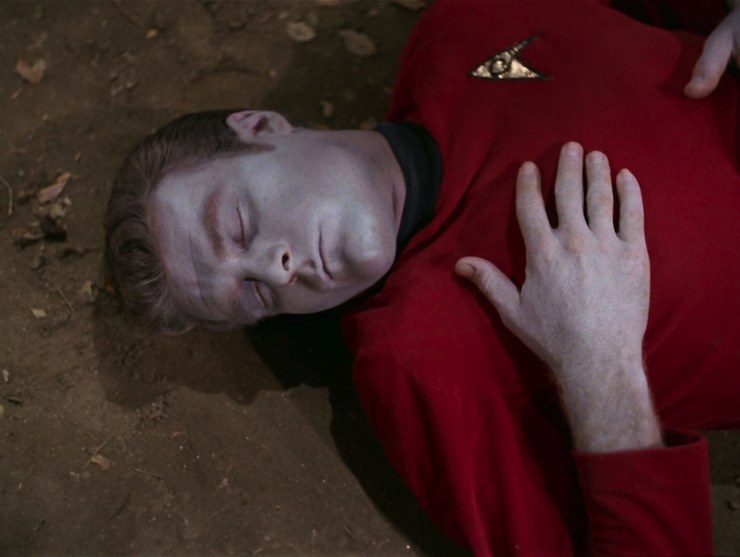
Kirk has encountered this cloud before: same odor, same method of killing. It was eleven years earlier, when he was a lieutenant on the U.S.S. Farragut. Rizzo is still alive, but he has lost a lot of a blood. Kirk also orders Spock to stay in orbit—but the Enterprise is due to rendezvous with the U.S.S. Yorktown to accept delivery of highly perishable vaccines that are urgently needed on Theta VII. Kirk however insists that they remain, even if people are endangered on Theta VII.
McCoy has Chapel restore Rizzo to consciousness briefly, and Kirk questions him. Rizzo confirms the honey-like smell.
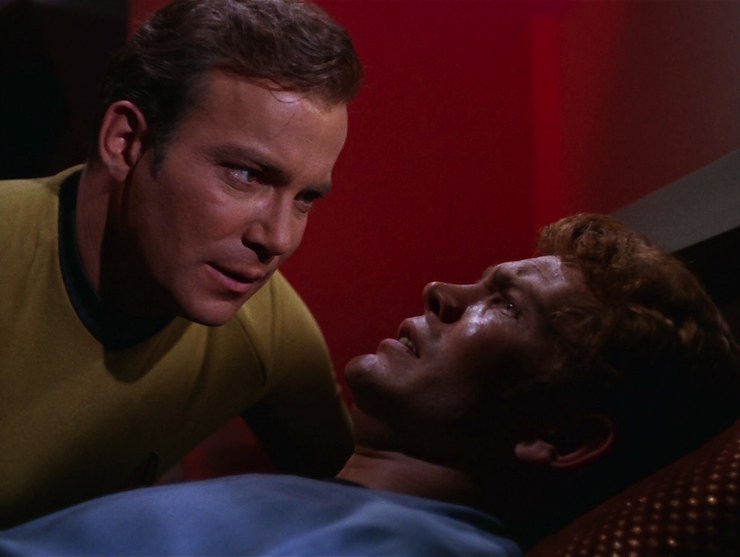
Kirk goes to the bridge, blowing off Uhura’s message from Starfleet and asking the security duty officer to report to the bridge. Spock finds no life, and no sign of dikironium, either. Kirk sends him to join McCoy in looking up the records of the Farragut from eleven years ago.
The duty officer reports to the bridge, and it turns out to be Ensign Garrovick, whose father was the captain of the Farragut under whom Kirk served eleven years ago. Uhura reports that Rizzo has died, and Kirk orders Garrovick to beam down with him and four security guards armed with phasers.’
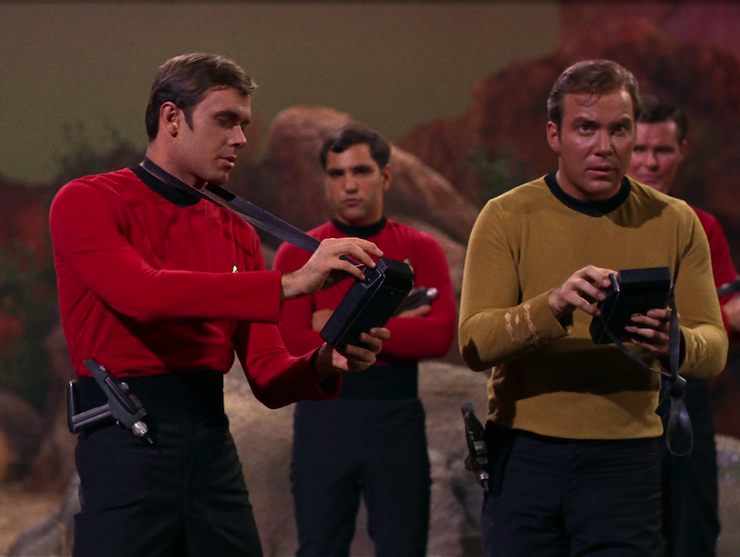
They do a scan, and they detect dikironium, but whatever they’re detecting can change its molecular structure. Kirk sends Garrovick with two guards in one direction while he takes Ensign Bardoli and another guard in a different direction. Garrovick’s team find the cloud creature, but though Garrovick fires on it (after hesitating), it still kills one of the guards with him and badly wounds another.
Kirk, Spock, and McCoy debrief Garrovick, who says it was a gaseous cloud that came out of nowhere and attacked the other two. Garrovick hesitated to fire on it, as he was startled, but then it moved away and he missed his shot. Kirk relieves him of duty and confines him to quarters. Spock and McCoy try to talk to him, but he blows them off, saying he’ll read their reports. He goes to the bridge, snaps at Scotty, Uhura, and Chekov, and then storms off.
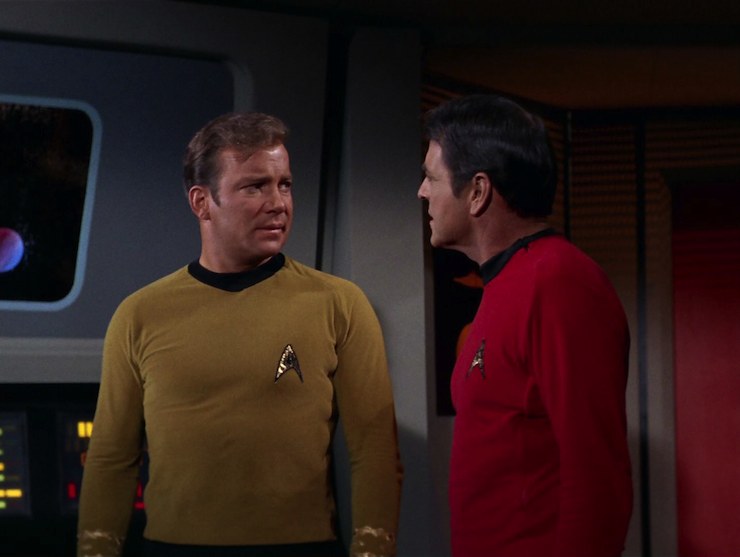
Spock goes to McCoy for advice on obsession. He believes that Kirk—one of the few survivors of the Farragut, as half the crew was killed, including Captain Garrovick, by a cloud-like thing—is obsessed with this creature.
McCoy goes to Kirk’s quarters and talks about how young officers on their first deep-space assignment might sometimes have trouble adjusting. Kirk thinks he’s talking about Garrovick, but McCoy’s actually talking about Lieutenant James T. Kirk, who hesitated to fire on the creature back on the Farragut. Kirk continues to blame himself for the deaths of two hundred people, even though the Farragut first officer did no such thing, calling Kirk a fine officer who showed uncommon bravery. Kirk insists that the creature has to be destroyed, and McCoy points out that he’s showing obsessive behavior, and he intends to file a medical report on the condition of the captain.
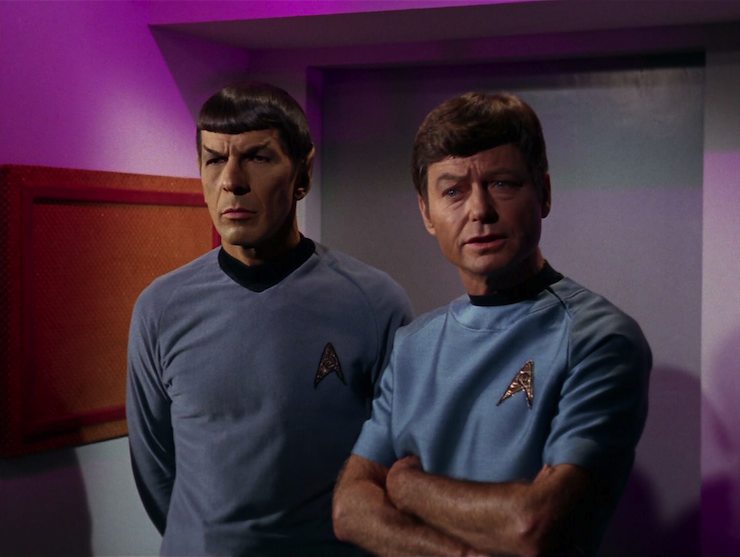
Then he brings Spock in as a command-rank witness. They both formally question the captain’s decision, per regulations, and Kirk slaps down their formality. He’s convinced that the creature has intelligence, that he sensed it as he lost consciousness. McCoy points out that in that state he could very easily have been imagining things, and the medicine they’re supposed to pick up from the Yorktown is perishable and desperately needed by Theta VII.
Chekov interrupts the discussion to say that they’re detecting the creature and it’s leaving orbit. Kirk calls red alert and heads to the bridge. Spock reports that it appears to be in a borderline state between matter and energy, with elements of both. The Enterprise gives chase at warp eight, which Scotty points out they can’t maintain for long. Very reluctantly, Kirk throttles back to warp six.
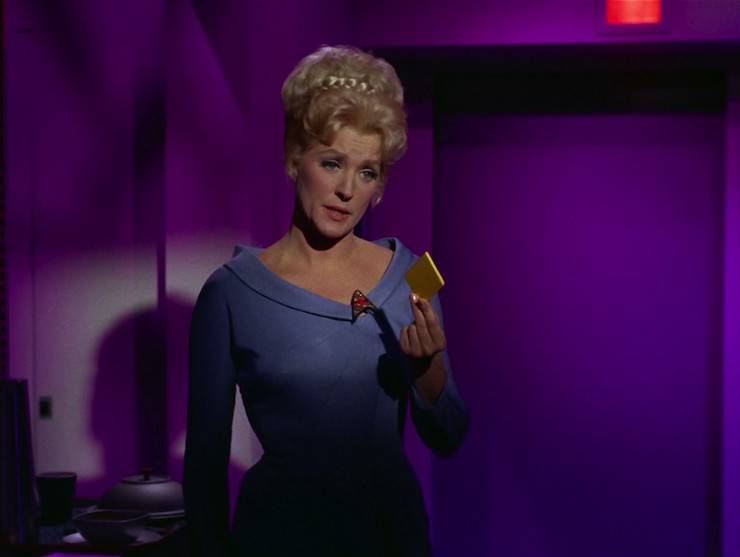
Chapel brings Garrovick some dinner. Garrovick asks what’s happening, and Chapel fills him in, saying it’s good that he’s out of it, given that Kirk has seemingly lost his perspective. Garrovick thinks he caused it by not firing fast enough, and Chapel responds to his self-pity with what she claims is McCoy’s one-word prescription: “eat.” Threatening to haul him to sickbay and forcefeed him intravenously if he doesn’t eat the tray she prepared, Chapel leaves. (The “prescription” was just a random tape she grabbed.) Garrovick, though, just throws one of the dishes at the wall (messing with his ventilation system).
The creature suddenly slows down to warp two. The Enterprise intercepts it and fires on it, to no avail. The creature moves past the ship’s shields and gets in through an impulse engine vent, killing one crew member and badly injuring another. It’s in the ventilation system.
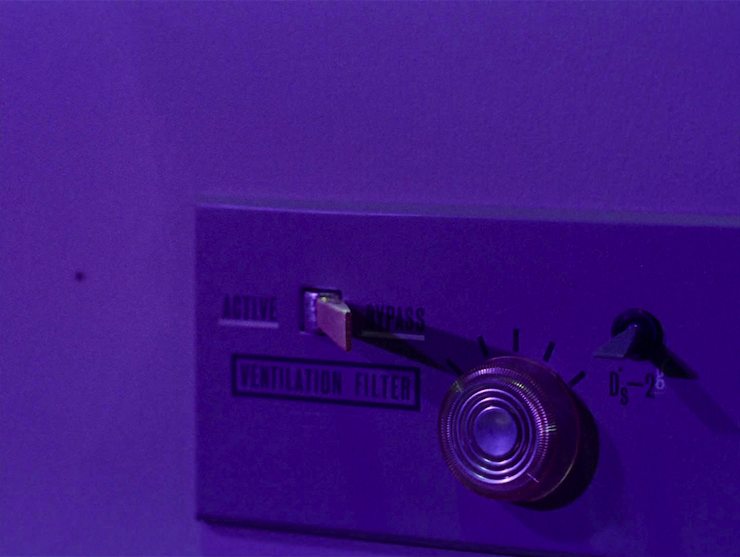
Spock now believes that the creature has at least a rudimentary intelligence, given that it turned to attack. He also points out the phasers were wholly ineffectual, which means Kirk’s hesitation eleven years ago, and Garrovick’s hesitation a few hours ago, were irrelevant. Phasers have no effect on the thing. Spock tries to convince both Kirk and Garrovick of this, to no avail. However, in the midst of talking to Garrovick, the creature gets into his quarters. Spock literally tosses Garrovick out of his own cabin. Garrovick reports in to the bridge, and Kirk has Scotty reverse the pressure in that cabin. Spock survived the attack thanks to his Vulcan blood.
Kirk talks to Garrovick and finishes what Spock started, making it clear that Garrovick’s hesitation didn’t matter. He restores Garrovick to duty.
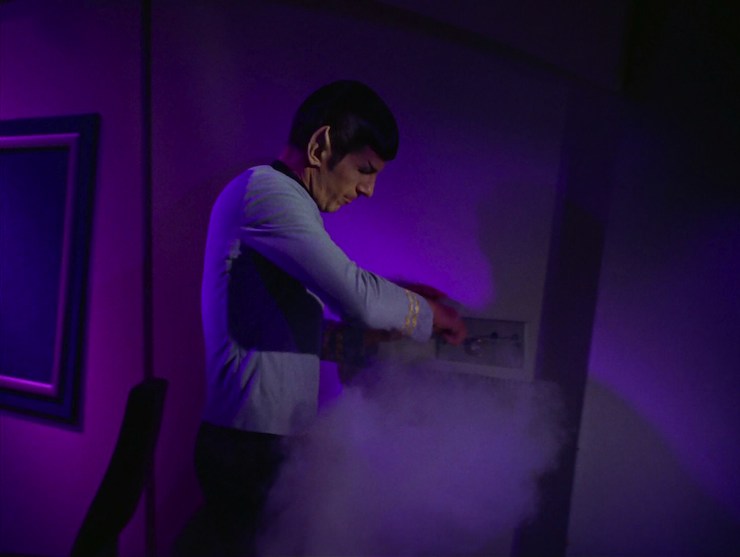
Scotty uses radioactive waste to flush the creature out of the vents, and it’s heading back to the impulse engine vent. It escapes the ship and proceeds at high warp. Kirk’s intuition is to head to Tycho IV, and he orders Chekov to follow it there, setting the rendezvous with the Yorktown back 48 more hours.
Kirk’s plan is to use antimatter to destroy it, after luring it with a case of hemoplasm, which has the red-blood cells it seems to love to munch on. However, beaming down is a two-person job, and even though it would make a billion times more sense to have Spock, who’s immune to the creature, beam down, Kirk insists on doing it his own manly manly self, aided by Garrovick, as the antimatter container needs two people to carry it.
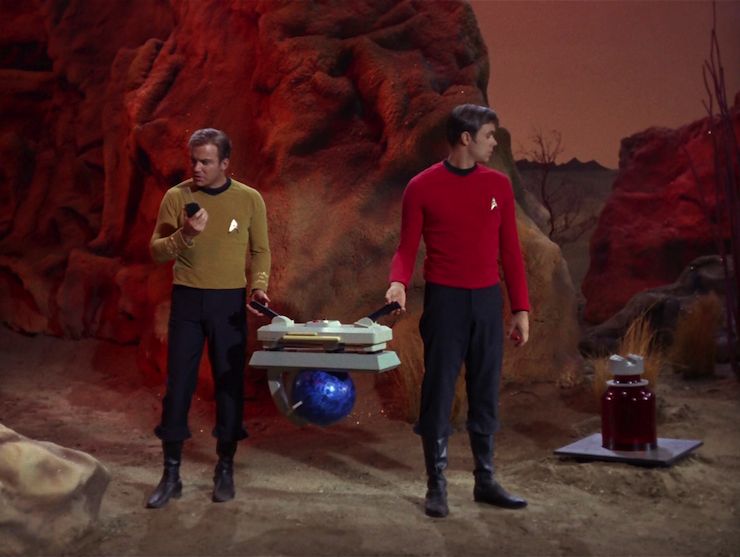
Unfortunately, the creature shows up and eats all the hemoplasm before they can even set the detonator. So they try plan B: use the two of them to lure it. (Kirk originally planned to lure it himself, with Garrovick beaming back, then Garrovick attempts to knock Kirk out so he can be heroic, and Kirk yells at him for being an idiot.) The creature comes close, then Kirk orders them to energize and detonate. Spock and Scotty struggle to beam the pair back, but eventually succeed. Everyone is relieved, and Kirk offers to tell Garrovick some tall stories about his father.
Can’t we just reverse the polarity? Spock is able to beam Kirk and Garrovick back by switching from Circuit A to Circuit B. That’s why they pay him the science officer money.
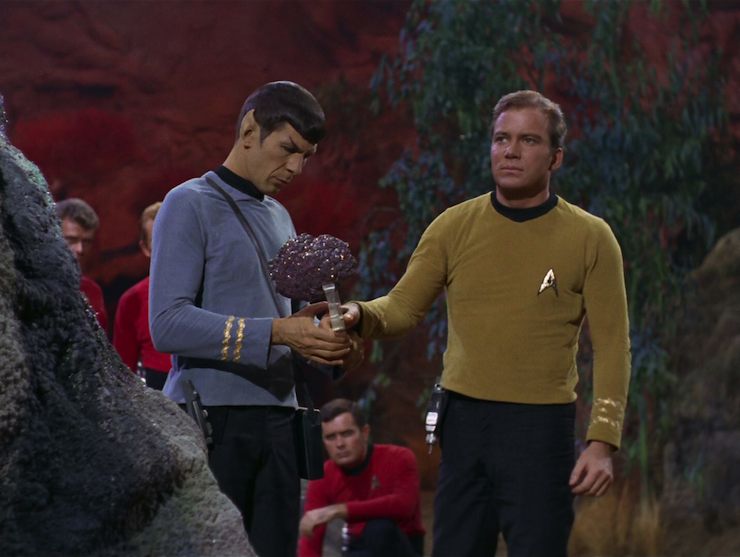
Fascinating. Vulcan blood, we learn, is copper-based, which makes sense given that it goes green when exposed to air. The creature seems to feed only on iron-based blood, so Spock survives its attack where no one else does.
I’m a doctor not an escalator. McCoy is legitimately concerned about Kirk’s obsession, though he does admit that Kirk was right that the creature is intelligent.
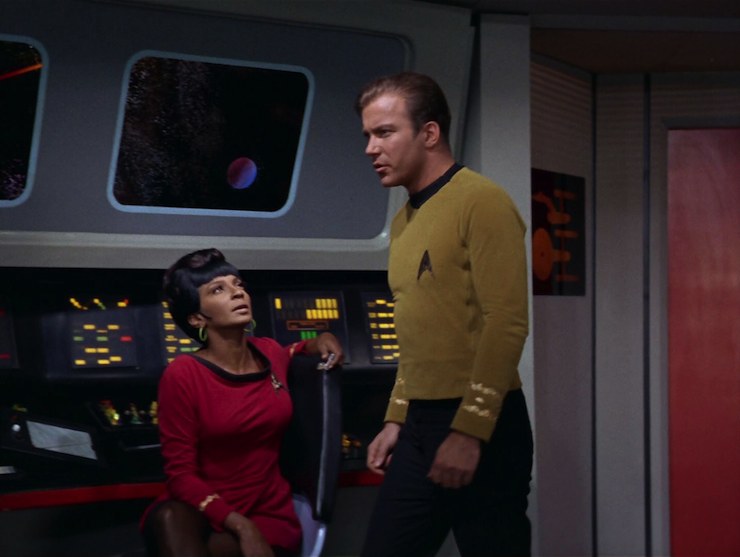
Hailing frequencies open. Uhura just keeps passing messages along, and Kirk keeps ignoring them…
I cannot change the laws of physics! Scotty keeps reminding Kirk that they have to rendezvous with the Yorktown, and also that they can’t maintain high warp for very long, and Kirk keeps ignoring him…
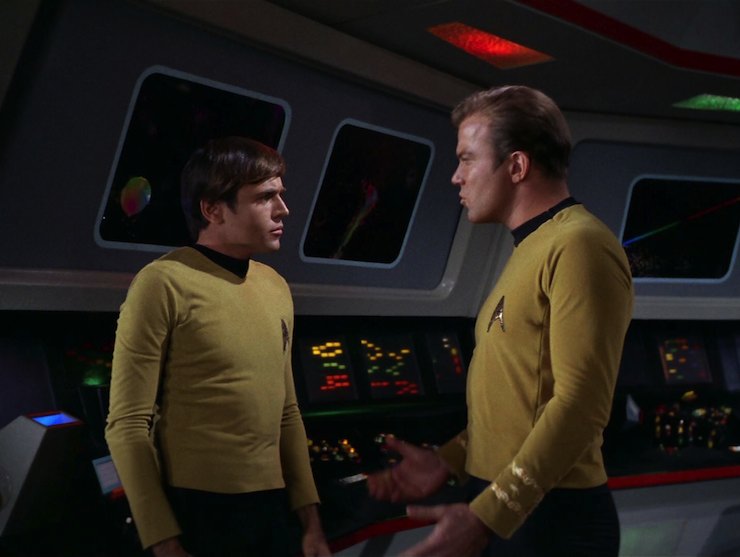
It’s a Russian invention. Chekov handles the scanners while Spock researches the Farragut mission, and Kirk berates him for not finding the creature fast enough.
Channel open. “I need your advice.”
“Then I need a drink.”
Spock and McCoy indulging in the usual banter.
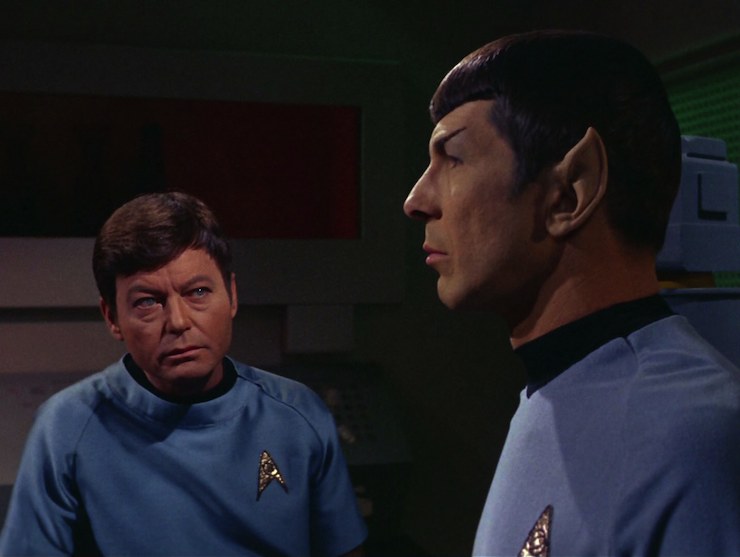
Welcome aboard. Stephen Brooks plays Garrovick and Jerry Ayres plays Rizzo. Ayres last appeared as another doomed crewmember, O’Herlihy, in “Arena.” Plus we’ve got recurring regulars James Doohan, Nichelle Nichols, Majel Barrett, and Walter Koenig.
Trivial matters: This episode establishes that Kirk served on the Farragut as a lieutenant. It’s likely that his first mission to Neural from “A Private Little War” was while he served on that vessel.
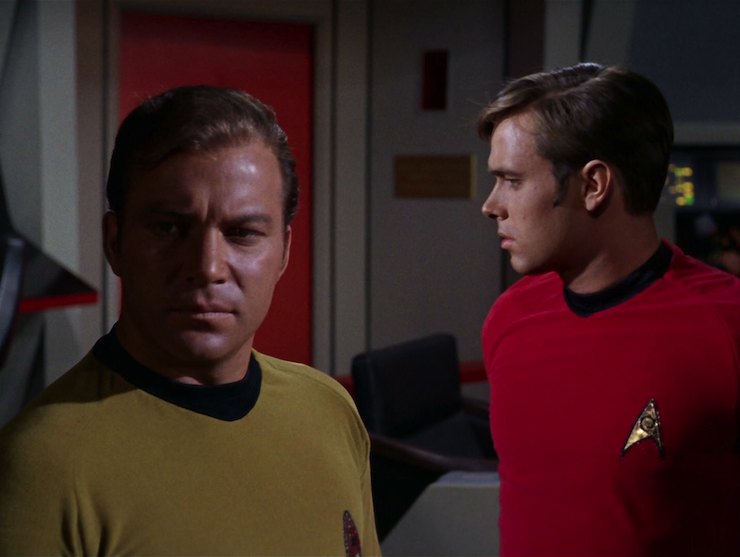
The first encounter with the creature was dramatized in the My Brother’s Keeper novel Constitution by Michael Jan Friedman, and the aftermath was shown in the graphic novel Debt of Honor by Chris Claremont, Adam Hughes, & Karl Story. Other missions of Kirk’s on the Farragut were chronicled in the novels The Ashes of Eden by William Shatner with Judith & Garfield Reeves-Stevens and Crisis on Centaurus by Brad Ferguson.
Chapel uses cordrazine to revive Rizzo, the same drug that was used on Sulu and on which McCoy overdosed in “The City on the Edge of Forever.”
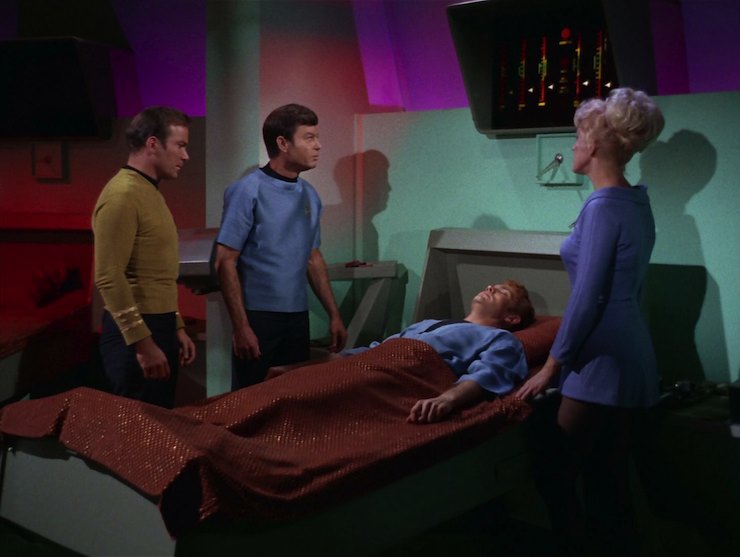
Garrovick appears again in the novels Home is the Hunter by Dana Kramer-Rolls and In the Name of Honor by Dayton Ward, as well as the aforementioned Debt of Honor graphic novel.
Eddie Paskey appears as the ubiquitous Leslie in this episode, and is killed by the creature. Despite this, he appears later in the episode and in thirteen more episodes, besides. According to Paskey’s web site, the script had a bit where the security guards who were killed were all revived by a miracle potion, but that scene was never filmed. It’s unclear whether or not Paskey was serious about that…
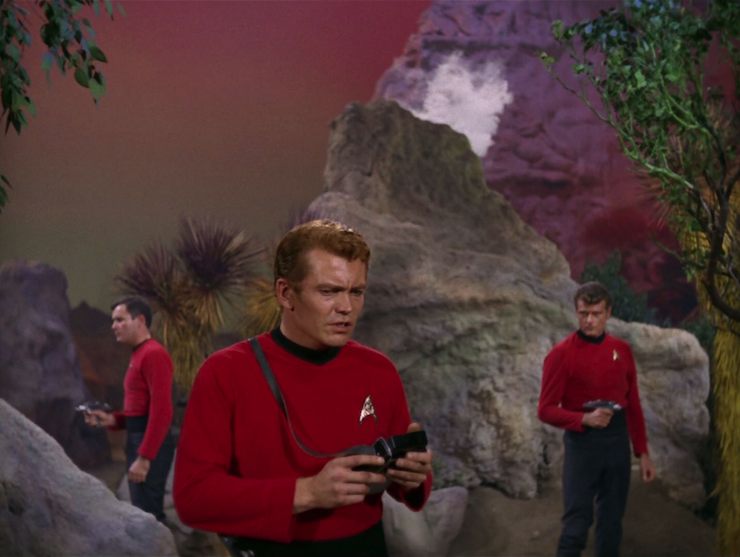
The short story “The Greater Good” by Margaret Wander Bonanno in Mirror Universe: Shards and Shadows established that the MU Kirk was regularly humiliated by Captain Garrovick on the Farragut, and young Lieutenant Kirk arranged to have Garrovick killed by the creature.
Producer John Meredyth Lucas directed portions of this episode that needed to be filmed on Friday October 13, 1967, when Ralph Senensky left the set to observe Yom Kippur.
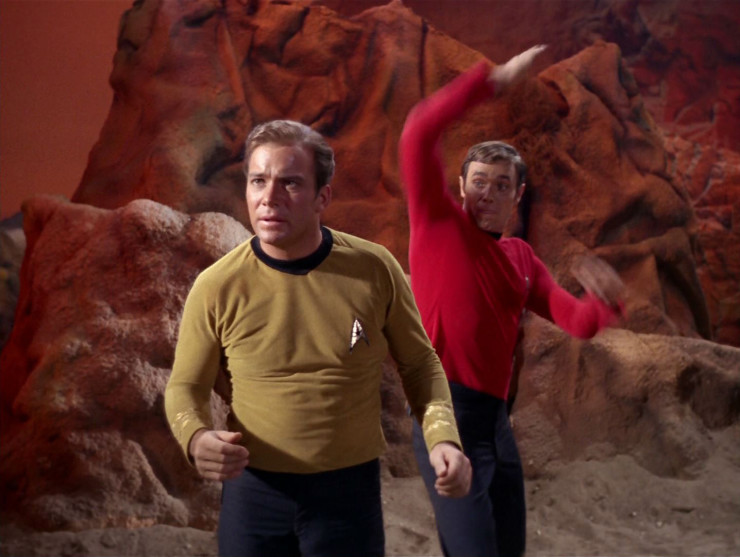
This is the first of two scripts by Art Wallace, who would later co-write “Assignment: Earth” with Gene Roddenberry. Wallace’s script was based on a concept by Roddenberry that was entitled “Space Moby-Dick.” (Really.) It’s far from the only time Trek would draw on Herman Melville’s famous novel for inspiration (cf. “The Doomsday Machine,” The Wrath of Khan, First Contact).
To boldly go. “Monsters come in many forms.” On the surface, this is a perfectly decent episode. It gives some insight into the captain’s past, a mission that he feels was left unfinished. Guilt is a powerful motivator, after all, and the same Jim Kirk who always takes on all responsibility for what happens on his ship was obviously formed in the lieutenant of eleven years earlier who blamed himself for the failure to stop the creature. The parallels between Kirk’s hesitation and Garrovick’s is nicely played.
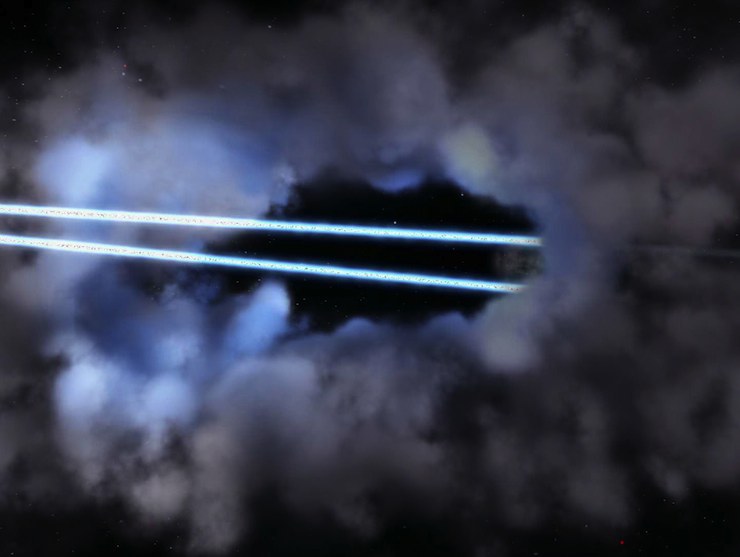
I also like the fact Spock, McCoy, and Scotty all call Kirk on his nonsense, but never to the point of caricature. They follow regulations, and also treat Kirk with respect—to a fault, honestly, considering that we’re talking about people dying on Theta VII.
In addition, there are some really strong individual bits here. It’s nice to see that at least two redshirts are permitted to be something other than cannon fodder. Rizzo is an actual person, and Garrovick even more so. Honestly, the level of involvement Garrovick has in the story is the level that security should have—something later iterations of Trek would understand much more, as the original series is the only Trek series in which the chief of security isn’t an opening-credits regular. Plus the conversation between Chapel and Garrovick is an absolute delight, a callback to the earliest days of the series when it treated the Enterprise like a large community of people instead of three dudes and some other folks who get occasional dialogue.
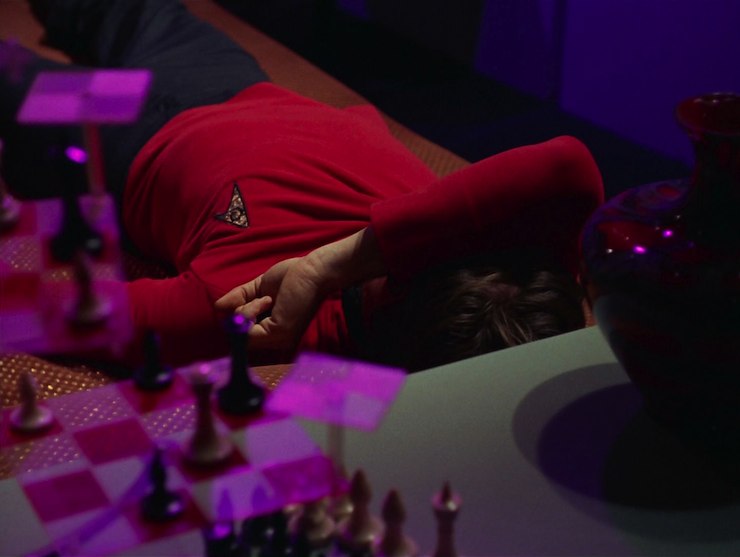
But overall, I just can’t get excited about this episode. Part of it is that I find that Kirk’s obsession to be completely not compelling. As we’re reminded—repeatedly—the Enterprise is supposed to be on a mission of mercy. Kirk’s unwillingness to complete that incredibly time-sensitive mission first before going after the cloud is irresponsible to say the least, and it’s hard to be sympathetic with him. He goes on about how captains are supposed to trust their instincts, but that doesn’t mean going off half-cocked, either. It doesn’t help that the deaths of Rizzo and his team, the two guards under Garrovick, and everyone else who’s killed (most of whom aren’t even allowed to have names, grumble mutter) all died because of Kirk’s obsession. The creature didn’t attack until he specifically sent Rizzo and the others to investigate. Yes, it’s a dangerous creature, but—I dunno, it just feels like everything was a weak-kneed hunch. And part of why I feel that way is because McCoy pointed it out, several times.
Just an underwhelming execution of what is actually a good concept.
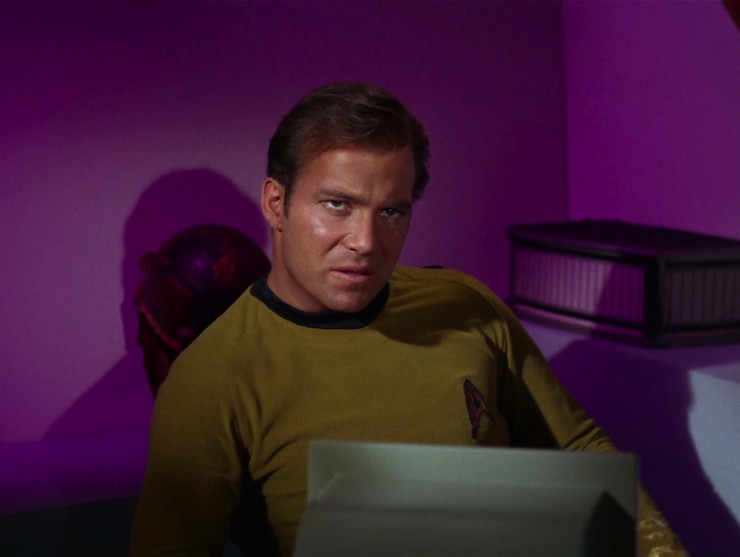
Warp factor rating: 5
Next week: “The Immunity Syndrome”
Keith R.A. DeCandido has a bunch of short fiction available right now: “Back in El Paso My Life Will Be Worthless” in The X-Files: Trust No One, “Streets of Fire” in V-Wars: Night Terrors, “Send in the Clones” in The Side of Good/The Side of Evil, “William Did It” on StoryOfTheMonthClub.com, “Down to the Waterline” on BuzzyMag.com, and in the short fiction collection Without a License: The Fantastic Worlds of Keith R.A. DeCandido.










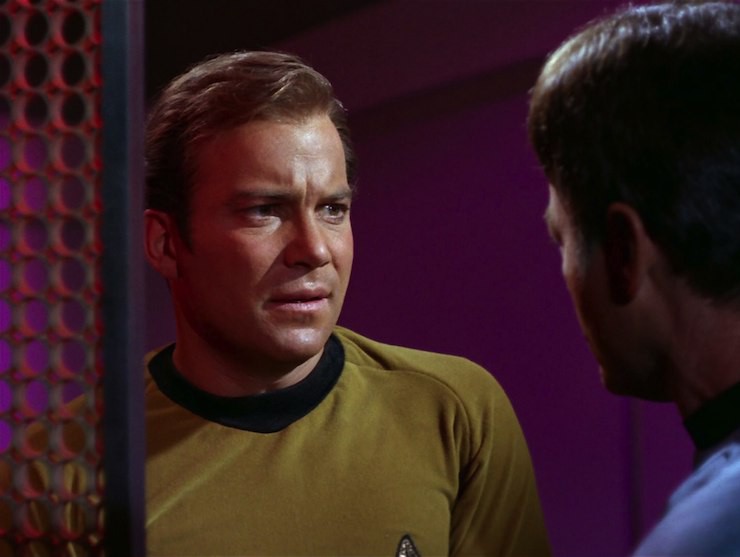
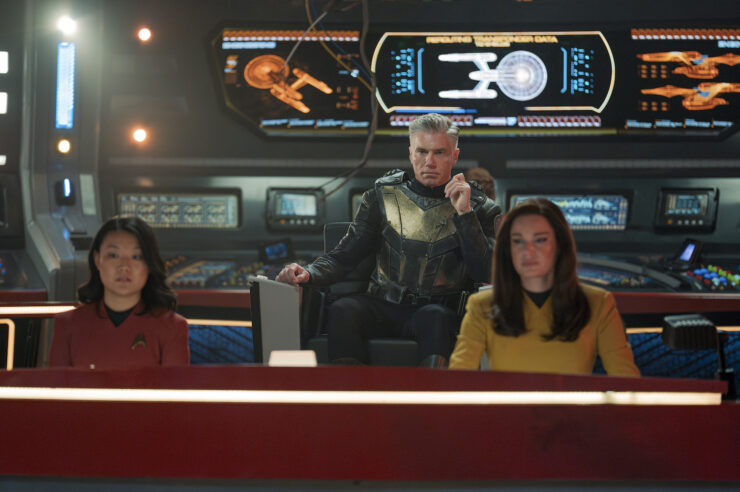
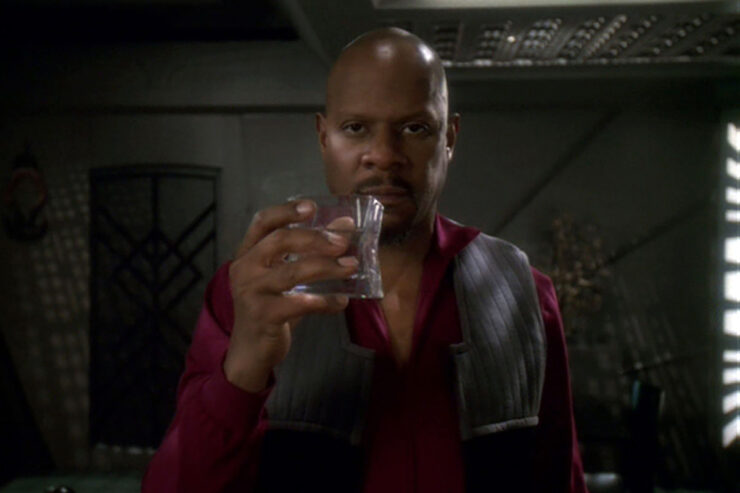
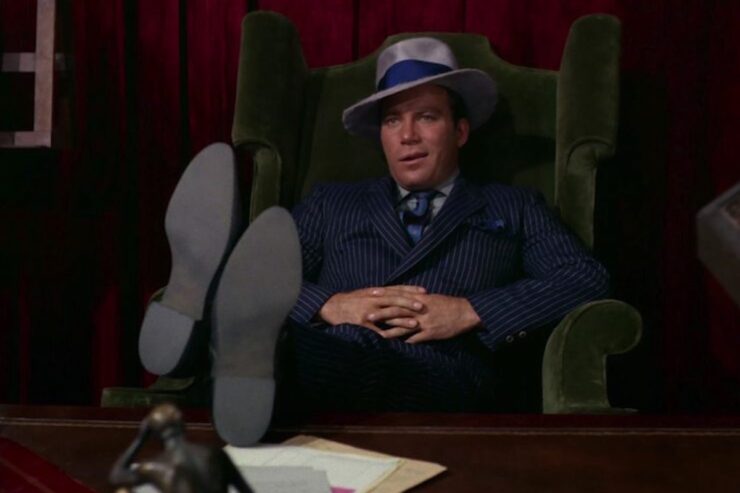
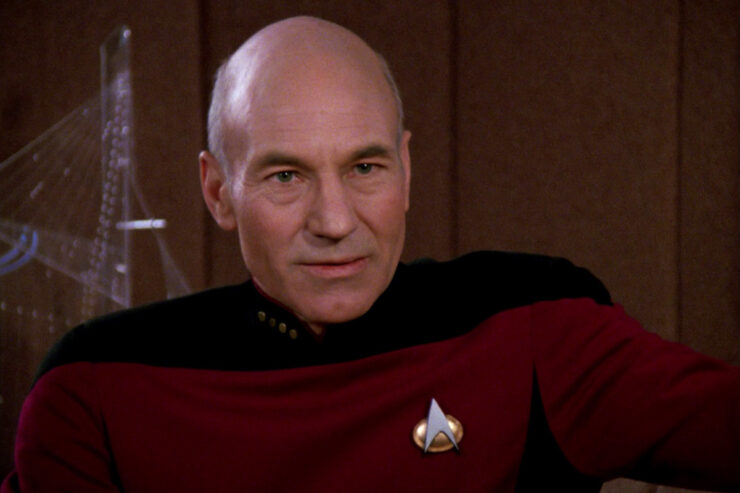
Perfect rating!
It’s always great to have a crewmember who isn’t in the main cast at the centre of an episode. I think the last time they did that was in Who Mourns For Adonais. It’s even better that it’s a security guard this time, because usually they just get killed, and that’s that. Although it’s quite a coincidence that he’s the son of the guy who was Kirk’s boss when the same thing happened to him, of all things.
It seems to me that the writers couldn’t make up their mind whether they wanted Kirk to be in the right or in the wrong. Either one could have made a good story, but this in-betweenness doesn’t really work.
Jana: Yeah, that’s it in a nutshell. I think that’s what contributes to my middling feeling on the episode, it just doesn’t commit…..
—Keith R.A. DeCandido
Pretty good character stuff here, but a lot of conceptual problems. A cloud creature that can travel at warp? That’s hard to believe, though warp-capable creatures would be seen frequently in later Trek shows. And if it’s part matter and part energy, why does it need to feed on blood? If it needed iron, carbon, oxygen, or nitrogen, it could get those more easily from asteroids and comets. You’d think its greatest need would be the rare di-kironium.
In my novel Star Trek: Titan — Orion’s Hounds, where I explored the galactic ecosystem of spacegoing life forms, I suggested that the “vampire cloud” was one of a breed of spacegoing creatures that had been artificially engineered with warp capability and a hunger for blood to turn them into bioweapons in some long-forgotten war. I also hinted that the Klingons had had some unseen encounter with a second vampire cloud (because I get tired of every historical reference in Trek books being exclusively to things encountered by ships named Enterprise).
Also, the idea that a starship has vents that are open to space and connected to the ventilation system makes no damn sense if you think about it. It’s a vacuum out there! All the air in the ship would be sucked out! Not to mention that it was a “radioactive disposal vent.” Having any kind of traversable connection between the shipwide ventilation system and a radioactive waste system is almost as terrible an idea as having one between the ventilation system and the vacuum of space. (Worse, Kirk actually suggests flushing radioactive waste into the vents on purpose!)
Then there’s the humongous miscalculation of antimatter’s explosive yield. Garrovick says there’s “less than one ounce” of antimatter. A full ounce of antimatter, combined with an equal amount of matter, would have a blast yield of only 1.22 megatons (as computed on this page, which actually cites the dialogue from “Obsession” before demolishing it). That’s on a par with the biggest US nukes in active service — formidable, but not even remotely enough to “rip away half the planet’s atmosphere.” (Also, Garrovick’s line implies that cobalt bombs are unusually powerful, but in fact, if any had ever been made, they would be unusually “dirty” bombs, spreading much more fallout than normal.)
It’s too bad Garrovick was only in this one episode. It could’ve been cool to have him as the recurring security chief, although he’d probably have to be a lieutenant for that.
@1/Jana: I think they wanted to flirt with the idea of Kirk being wrong, but 1960s broadcast standards wouldn’t allow a TV hero to be genuinely in the wrong, so he had to be vindicated.
Kirk’s urgency in killing the cloud ahead of his actual mission might have been concern that the cloud would reproduce when it reached “home”. Yes, this sounds similar to “The Immunity Syndrome”, in which that concern was actually stated. I don’t recall whether it was stated in “Obsession”.
richf: It was mentioned briefly by Spock at one point, but there was nothing else in the episode to support the notion, nor was it discussed in any depth beyond that one mention.
—Keith R.A. DeCandido
For all that I’ve built much of my career on explaining away Star Trek plot holes, I still have no idea how to cope with Leslie’s death and resurrection here. I’d be willing to believe Paskey’s character in the first part of the episode was somebody else, but Kirk actually addresses him as Leslie there. Was he less badly drained than the others? Was he actually twin brothers? (That could explain some early episodes where Paskey’s scene in two different places and uniforms in near-consecutive shots.)
Pretty much agree with all of the above. The episode has some potential, but I find it pretty hard to connect with Kirk’s obsession because it almost seems petty and selfish compared to their current mission. So he hesitated as a junior officer. Big deal. I do like the sense of dread the episode manages with what’s essentially a cloud entity. Kudos to Senensky’s direction.
Garrovick is definitely the episode’s highlight. A real attempt at fleshing out a redshirt that’s very well played by Brooks, with him actually getting a solo scene with Chapel of all people. They should have learned from this and spent more time with these secondary characters. Not every episode needs to adhere to the Kirk/Spock/McCoy formula.
“Vulcan blood, we learn, is copper-based, which makes sense given that it goes green when exposed to air.”
You know, interestingly enough, there actually are creatures on Earth with copper-based blood, but their blood is blue. The green=copper connection from copper patina wouldn’t really carry over to a hemoglobin-like molecule, because copper oxide isn’t a reversible binding. Given sulfhemoglobinemia, a disorder associated with certain sulfonamides that turns blood green as a result of getting sulfur binding inappropriately to hemoglobin, you might want a sulfur-based blood for it to be green. (Maybe not, though, since sulfhemoglobin can’t actually properly carry oxygen.)
@8/Idran: I tend to assume that Vulcan blood contains some yellow-tinged compound that combines with the coppery blue to make it appear green.
@6: “I’ve built much of my career on explaining away Star Trek plot holes…” I say this with the utmost affection for the series, but I think Mr. Bennett is to be congratulated on finding the key to never lacking material! = chortle =
In any event, I think this episode gives us one of our first glimpses of a side of Kirk’s personality we’ll see in his attitude toward Klingons in the movie series. For that matter, one could posit, in retrospect, that this episode explains why he’s so jittery about V’ger in TMP.
@10/Don S.: Nice thought, but TMP Kirk’s only personal stake in V’Ger (aside from, well, the whole planet being endangered) was that it gave him an excuse to get the Enterprise back. Which was very much an obsession, and McCoy even called him on it in much the same way he did here.
@9/CLB: Haha, that’s so simple I hadn’t even thought of it. Nice.
@10/Don S.: I think Kirk’s attitude toward Klingons in the films is consistent with his attitude toward Klingons in the episodes we’ve seen so far.
I think they overdid it adding the Theta VII mission to the plot. This episode would have worked much better if it was just Kirk’s obsession and struggle. All those deaths would have been enough to put him in the wrong and internal conflict is always a good plot device.
But this time sensitive rescue mission throws shadow over everything. It’s hard to find any sympathy for Kirk when it’s stated that a lot of people are in danger because of his actions, all his inner problems seem petty. Spock and McCoy are in the wrong too allowing him to go on. I suppose they tried to make everything as dramatic as possible but in the end it came to the opposite effect – everything falls flat.
Too bad because the idea was much better than the execution
This is one of my favorite episodes, and one I’ve always felt is under-appreciated, so I’m disappointed at Keith’s rating.
I really like it, however, for many of the things Keith and others seem to like about it – the character moments, the Kirk, McCoy, Spock interaction, Garrovick, etc. Rewatching it the other night, it also seemed to me like it’s one of the better paced episodes of the series, and with well-written dialogue as well. I guess those things to me just outweigh some of the other problems noted here. And some of those are pretty big – like Christopher pointed out, the whole vent system as described here is just a big disaster waiting to happen. But in this same episode (and others, too!) Scotty’s crying out that the ship will blow up if they don’t slow down. You would think there’d be some sort of gauge or regulator in the system to simply shut it off before it got to that point . . .
Still, this is a high point of the series to me.
I forgot, I meant to say the same thing as Darr, they should have just dropped the rescue mission. The extra urgency doesn’t really add anything but plot holes.
Regarding the Theta VII mission. I get the sense that the writers tried to cram a “ticking clock” element into as many episodes as they could. I’m wrapping up Season 3 in my own TOS-watch right now and lately it has been particularly bad. It seems that in every other episode there is some sort of plague that will kill everything in exactly 4 hours, or whatever.
Since we’ve arrived at another Ralph Senensky episode, I’ll post another link to his blog where he discusses some memories from filming:
http://senensky.com/obsession/
@10/Don S. I don’t thing there are any parallels with Kirk’s attitude to Klingons. For almost the whole of Kirk’s career Klingons are at some or other sort of war with Federation, so for (most of) those who serve in Starfleet they are seen as enemies first. At least towards the end of Undiscovered Country Uhura and Chekov(?) sort of confirm it stating that they agree with Valeris. And also there are Klingons killing Kirk’s only child to add a personal twist to animosity… Which by the way doesn’t stop Kirk or his crew doing what is required of them, shoving personal opinions aside.
This episode’s obsession is different – for one, it really is an obsession. Ok, there was a traumatic experience but it hardly warrants “kill it at all costs” attitude and willingness to risk the ship and everyone aboard that Kirk exhibits. Come to think of it, it’s rather out of character compared to what we see in the series. Also there is The Conscience of the King with basically same plot and almost same mistakes Kirk makes, but on the whole it is rather more believable than Obsession.
When I watched Star Trek as a small kid, this episode and “Operation – Annihilate!” where the ones that gave me nightmares for years.
The latter at least made me only wary of crossing any threeshold without checking if something was waiting for me on the walls, but the idea of an unstoppable monster made of air that I could not keep away with any normal defence simply terrorized me…
As a kid, plot holes, bad acting and questionable moral problems simply flew over my head.
This reminded me of the “relative of a former officer/friend” trope that RED SHIRTS made so much fun of.
Of course, I’m sure the good ol’ starship captain club often gives special attention/berths to the children of friends and colleagues so that’s not too much of a surprise.
Considering the large number of dangerously bonkers former starship captains TOS came across, I’m surprised that Spock and McCoy weren’t more worried about Kirk’s behavior.
The Autobiography of James Kirk also dramatizes the Farragut flashbacks from this episode.
That’s twice that someone has said the Farragut events were “dramatized” in a book. I’m not sure that’s the right word to use for a portrayal in prose. “Dramatize” literally means to make something into a play, to adapt it for a format that can be acted out on stage, screen, radio, or the like. I guess maybe you could extend it to include a prose dialogue scene, but I’m not sure.
Christopher – I think you meant Titan: Orion’s Hounds
A good episode, not great but solid. Has there ever been a story that followed up the situation on Theta VIII? I wonder how many people died and what Starfleet’s reaction to Kirk’s actions were. Holding up an entire Constitution class starship and delaying the delivery of emergency supplies is not something that should be taken lightly. But, then again, it’s Kirk so he probably got a medal for it.
Nice to see security get some characterization even though there’s a fairly high body count. They should be just as professional as the rest of the crew and not so easily knocked off by the threat of the week. But, as usual, it’s an easy way to make your antagonist seem like a badass by making some of the good guys into idiots and disposable targets.
Lots of Kirk’s background comes from when he was a Lieutenant and, as far as I can recall, none from Ensign or Commander grades. However he did jump straight from Captain of a starship to Chief of Starlet Operations so perhaps he skipped a grade tr two along the way. Hell, in the reboot moviehe went from a Lt (and third year cadet) straight to Captain so who knows how they decide promotions in the future.
Strangely, the Lights of Zetar states that no natural phenomenon can travel faster than light but perhaps they don’t mean living organisms. I can’t imagine how a cloud could 1) be a living organism or 2) manage to develop the ability to travel at warp though (Orion’s Hound’s explanation notwithstanding).
@3/Christopher: You’re the expert on 1960s TV, but I would have thought it possible to have the hero be wrong if he realizes his mistake in the end. Isn’t that what they did in Errand of Mercy?
@18/Darr: Good analysis! Additionally, I find that The Undiscovered Country is a lot like The Devil in the Dark: At first Kirk only does his duty, but a few minutes of talking to the dying Gorkon are enough to make him really believe in the peace process, and no show trial, labour camp, or assassination attempt can change that.
@20/MByerly: Well, Kirk at least didn’t give special attention to Garrovick, or he would have known that he is his old captain’s son when they meet on the bridge. So it’s a coincidence. An unlikely one.
Are there really so many crazy starship captains? There was Matt Decker, but he had only recently lost his crew, so that’s not the same kind of situation. Ron Tracey wasn’t mad, only corrupt, and besides, they don’t know about him yet. And I’m not sure if they’ve already heard what happened to Garth.
@23/kkozoriz: Um, why would Kirk get a medal for that? Do we ever see him get a medal for questionable behaviour?
Regarding Kirk’s background, I don’t think we learn enough about his past to draw conclusions about his career. How many episodes mention his time as a lieutenant anyway? This one, Where No Man Has Gone Before, A Private Little War. Any others?
As an aside – do we ever see anyone on TOS get any medals at all? I’m almost tempted to dig out any season 3 episode where they are in dress uniforms and compare to Court Martial.
@22: I thought the exact same thing after I posted my comment. I tried to edit it because the scenes were neither dramatized nor actually flashbacks.
I guess it’s accurate to say the book told the story of Kirk’s encounter with the cloud on the Farragut. But that fails to properly describe that the story is played out from Kirk’s perspective rather than just described as it is in the episode.
@23/kkozoriz: Right, Orion’s Hounds. Fixed now. That and TNG: The Buried Age were consecutive novels for me, so I guess they’re linked in my mind.
Two things the Federation badly needs to invest in:
1) Medical emergency ships whose sole purpose is to transport medicine/vaccines/serum at high speed. These would be smaller, specialty ships. All they really need is a proper storage hold with a big warp drive strapped onto it. This way, they can stop diverting battle ships and hundreds of military personnel to do it for them. While Kirk was really, really wrong in this one, the only big battle ship for light years around shouldn’t have to be making choices between dealing with killer aliens and killer germs.
2) How about some local, medical personnel? How often should an entire PLANET not have the ability to deal with a disease outbreak? I’m sure the Federation is saving a ton on medical premiums, but this is just ridiculous.
The best way to “dramatize” the Farragut incident would be to put it in a movie. If only there had been some sort of movie based around a younger Kirk that could have done it, it would be such a logical fit. Still I’m sure if Paramount decides to go with a young Enterprise crew movie they would not overlook such an obvious candidate for a story, and a story which shows the gradual shaping of Kirk into a leader.
@11: Interestingly, in the following picture, McCoy does a 180, urges Kirk to get the Enterprise back.
@13: A parallel with Picard’s attitude toward the Borg–both justified by the characters’ experience with the aliens in question, of course.
@30/Don S.: I’d say the contexts were different. In TMP, McCoy wasn’t saying that Kirk shouldn’t be in command of the Enterprise, just that he couldn’t be an effective commander if he let his obsession with having command blind him to other priorities and responsibilities — like, say, listening to Will Decker and taking his experience and familiarity with the redesign into account.
Indeed, according to Roddenberry’s TMP novelization, the reason McCoy resigned from Starfleet in the first place was in protest of Admiral Nogura’s decision to promote Kirk out of starship command and give him a desk job. He would’ve agreed with Spock that command was Kirk’s “first, best destiny.” He just wanted it to be a healthy and reasonable approach to command rather than an obsessive one.
Quite apart from the way the medical service was organised the way Rizzo dies doesn’t make sense to me; even if you assume he didn’t lose all of his corpuscles he’d be severly oxygen deprived and the viscosity of his blood would be so different it would cause pressure problems. It wouldn’t be possible to revive him for any meaningful conversation, unless you could do a rapid transfusion at which point there is no medical reason for him to have died at all.
I always endure “The Gamesters of Triskelion” because I know this episode is next. A solid episode, but I too wish the writes would have committed to Kirk being right or wrong. As someone said, they did that effectively in “Errand of Mercy.” Garrovick is a great character, and shows what the show could have been like with a more ensemble approach, rather than just Kirk, Spock, McCoy, and the rest.
CLB, I’m really glad you explained how a cloud could travel at warp in space, but needs to consume blood. An ancient bioweapon makes perfect sense. I’ll be checking out those novels to see how the Klingons fared against a “vampire cloud.”
Another thing I liked about this one is that the red alert beacons blinked the way they’re supposed to rather than continually flashed. This is the the only episode of the second season where that’s the case. Every other episode in season 2 the alert blinks for a short while then flashes continuously.
@33/Dante: I only alluded to the vampire clouds in passing, and mentioned that both were destroyed. It’s, like, two paragraphs out of the book. Although don’t let that stop you from reading Orion’s Hounds. It’s one of the books I’m proudest of in my career to date.
@24. JanaJansen – This is the same Starfleet that rewarded Kirk after he disobeyed orders, assaulted Starfleet personnel, stole a starship, travelled to a planet that was forbidden, destroyed aforementioned starship all to resolve a situation that wouldn’t have existed if it weren’t for Kirk dropping a group of genetic supermen on a planet and then not telling anyone that they were there. Not to mention the fact that the crews of the Grissom and Regula One would still be alive if Khan hadn’t managed to escape and steal Genesis.
Starfleet just loves Kirk. He gets away with everything.
It’s interesting to compare this to Devil in the Dark. In this case, Kirk decides to continue his quest to see the cloud creature is killed even after he decides it'[s intelligent.
If the cloud needs blood to survive, why is it hanging out on two uninhabited planets? Perhaps they’re where they go to reproroduce, the same reason why Kirk decided not to kill the horta. It was just a mother protecting it’s young. Who’s to say the cloud creature wasn’t doing the same thing? Perhaps the whole blood sucking aspects isn’t feeding but simply a self defense mechanism against the types of lifeforms it most often encounters, i.e. humans. Perhaps it was just too strange for our intrepid crew to think of it as anything other than evil?
@35/kkozoriz: Starfleet doesn’t reward Kirk for any of that, but for saving Earth from the whale probe afterwards. Technically they don’t reward him at all, they demote him. Concerning Khan, we know that Kirk does tell Starfleet about him – we hear him make log entries. Why this information isn’t in the records twenty years later is anybody’s guess. It’s only one of many things that don’t make sense in that film. (Like, why are there Klingons in the Romulan Neutral Zone in the Kobayashi Maru simulation? Why does Kirk have the exact same personal problems he already solved in the previous film? How can Genesis ever be useful on a large scale if it already takes them such a long time to find one suitable planet for experimentation? Why is it even needed, when in the time of the TV show there were so many habitable planets that starship captains could just give them away? And so on.)
The difference between the cloud creature and the Horta is that the Horta got wounded first, which gave Kirk the opportunity to see it as something else than a threat. We talked about how he tends to go for the military solution first in the “A Private Little War” rewatch.
You could say the same thing about the pancake aliens in “Operation: Annihilate”, and we’ve been saying the same thing in these rewatches about “The Man Trap”. In-universe, it’s consistent character behaviour. Out-of-universe, in the great episodes (usually written by Gene Coon), the monster isn’t really a monster, whereas the mediocre episodes use the standard Science Fiction monster as a plot device.
It might have worked if it had turned out, during that brief moment when Kirk “felt” the creature’s intelligence, some kind of low level, psychic bond had been formed. When Kirk met up with the creature again, he could sense some of its intentions. Then, have Kirk turn out to be right because the creature’s intention was to head onto a heavily populated planet (perhaps, as an intelligent bioweapon, it’s been studying up on humans. No one knows this because Kirk’s ship was the only one with survivors. Now, it feels it understands humans well enough to do what it was designed to do–to seek out new life and civilizations, to boldly eat them up where no one has eaten them up before.
Of course, that would mean it’s probably too smart to veer off just to grab a snack, but it may be intelligent enough to realize its connection to Kirk is a dangerous liability and wants to kill him.
By the way, I’ll let Kirk off for the mistakes he makes at the very beginning. He smells something he last smelled on a different planet, light years away. It may trigger some strong memories, but his rational mind is probably telling him he’s going to find out it’s a local flower or something. He’s shaken up enough to give a warning, but he likely thinks he’s jumping at shadows.
36. JanaJansen – They run through the charges before his trial, mention saving the Earth in passing and the give him exactly what he wants. Much like Spock in The Menagerie, he can break all sorts of rules, regulations and laws and come out smelling like a rose for no reason other than the fact that as the hero he’s supposed to win. I’d rather see someone make a mistake or break a rule and then have to deal with the consequences. But Kirk doesn’t have to deal with consequences, at least in the long run because he’s Kirk.
Kirk may mention Khan in his logs but they’re really meant more for the viewers. He even makes log entries when he’s got no way to actually do so. In universe, it’s more likely that Kirk only mentioned Khan in his personal logs and not the official ones, hoping that nobody would stumble across Khan and give him a chance to escape. Great plan there Captain. How’d that work out for you and the hundreds of dead people. But at least you got your best friend back so all is well.
Other than the attacks on the Farragut and the landing party in this episode, there’s no evidence that the cloud has killed anyone. Angus and Tycho are the only planets that it’s encountered at and they’re both uninhabited. Both times, Kirk mentions that the ship is surveying the planet. No indication of a civilization at any tech lever, from stone to interstellar. No mention of a former civilization either. No ruins. It’s more likely that the cloud was simply protecting itself from what is saw in intruders and for that, Kirk blew away half the atmosphere of a habitable planet.
That’s where this episode falls down for me. The monster is just a monster. Where’s the fun in that? It’s re-telling Moby Dick except Captain Ahab survives this time. Apparently, obsession is a good thing as Kirk is 100% right. Give me a Kirk that actually learns something from his adventures. Errand of Mercy being the best example of this. The look on Kirk’s face when he realizes that he’s arguing FOR the war is one of the great Trek moments. It’s a lesson his Nu-universe counterpart learns in Into Darkness which is rendered silly by the fact that he’s talked out of killing Khan by Spock who talked Kirk out of saving Nero in the previous film. Apparently killing someone without a trail doesn’t apply to non-Federation members, The grin Kirk gets when he realizes that he’s been given the go ahead to kill Nero was the cherry on top of the “why I’m not enjoying this” sundae. Then there’s the demotion in Into darkness where Kirk actually does face a demotion for something he’s done but it’s then totally wiped out in about 5 minutes (in the movie, a few hours at most)
Let my heroes make mistakes but also let them face consequences for them. Let them learn from both.
@37/Ellynne: I like your revision of the episode!
@38/kkozoriz: I mostly agree with you about this episode. I thought I said that. I agree about the new films, too – I don’t like either the Kirk or the Spock character in them, nor they way they act.
Concerning the rest of your comment – first of all, let’s keep in-universe and out-of-universe perspectives apart.
In-universe, of course they rush through the charges and give him exactly what he wants. He just saved Earth from total annihilation! How would they look if they did anything else? Besides, he has friends in high places now (Sarek), something he didn’t have during the time of the TV show.
Out-of-universe, I agree with you… partially. Sure, there’s a lot of cinema logic involved. As you said, it’s like The Menagerie. It’s also like Amok Time, where they don’t have to face consequences either. The (out-of-universe, film/TV logic) reason in all these cases is that Kirk and Spock actually did the right thing by helping their friends, and thus shouldn’t be punished. Not the same situation as in Errand of Mercy or this episode at all.
So, no matter how you look at it, the reason is not “because he’s Kirk and can get away with anything”.
Finally, Space Seed. Here I don’t agree with you at all. I like that episode a lot, and one of the reasons is the ending. To figure that it wouldn’t do any good to put Khan in a prison and give him a planet to settle instead is a lovely thing to do, and also a very Kirkian thing. (Gene Coon is definitely my favourite Star Trek writer.)
And there is absolutely no evidence anywhere in the episode or in the TV show that he didn’t make a report about it. I don’t agree that “in universe it’s more likely that Kirk only mentioned Khan in his personal logs”. Why should he? What reason would he have to keep that encounter secret? It doesn’t fit the circumstances or his character.
So sixteen years later some guy makes a film based on the assumption that everyone has forgotten about Khan, which is only one of so many plot holes in that same film. If you feel that this particular plot hole needs patching, sure, assuming that Kirk never wrote a report is one way to do it. Only that it totally ruins a fine episode and a fine character, retroactively. It makes as much or as little sense to invent a glitch that erased the files instead, or blame it on Section 31, or whatever. The choice is yours.
I agree that it’s fine for heroes to make mistakes and face the consequences. I like Errand of Mercy too. (Another Gene Coon episode!) But let’s not mix up the heroes’ mistakes with the filmmakers’ sloppiness.
@36/Jana: “It’s only one of many things that don’t make sense in that film. (Like, why are there Klingons in the Romulan Neutral Zone in the Kobayashi Maru simulation? … How can Genesis ever be useful on a large scale if it already takes them such a long time to find one suitable planet for experimentation? Why is it even needed, when in the time of the TV show there were so many habitable planets that starship captains could just give them away? And so on.)”
I agree that there are a ton of things about The Wrath of Khan that make no sense, but these questions actually do have answers. The Kobayashi Maru is a simulation designed to be unwinnable, to be an absolute worst-case scenario, so it doesn’t have to be a probable real-world scenario.
As for Genesis, a valid scientific experiment requires controlling all variables more completely than would be necessary in real-world use. The goal is to assess Genesis’s ability to create life from lifelessness. In order to prove that it’s actually doing that, it needs to be tested in environments that are known to be lifeless to begin with — otherwise there’s no way to know for sure that the life you find afterward was actually created by Genesis rather than having been there already. It’s the same reason that if you send a space probe to Mars to search for life, you try to sterilize it as completely as possible beforehand, so that you can be sure any life you find is native to Mars rather than being Earthly microbes that hitched a ride on the probe.
So it’s not that Genesis could only be used on lifeless environments — it went off on the Reliant, which was not lifeless, and Kruge saw it as a potential weapon of mass destruction that could be unleashed on populated worlds. It’s just that it needed to be tested on lifeless environments to prove that it actually worked.
And while there are a lot of habitable worlds in the Trek galaxy, quite a few of them are either claimed already, inconveniently located, alien enough to require laborious terraforming, or home to unanticipated hazards (Berthold rays, unrecognized native life forms, random explosions, ancient ruins containing eldritch horrors, etc.). The ability to create perfect designer planets to order would definitely be seen as an improvement.
@38/kkozoriz: “He even makes log entries when he’s got no way to actually do so.”
The original intention was that the episodes we saw were dramatizations of the log entries that Kirk recorded after the fact. In the early episodes, the narration is often in past tense. For some reason, they lost track of this and started doing them in present tense even when it didn’t make sense.
This. SO much this. Watching someone’s obsession should be much more captivating, and I…well…I fell asleep during my rewatch of this last night. If Shatner had played Kirk the way Woodward played van Gelder, this would have been a much more enjoyable episode.
@40/Christopher: OK, a simulation doesn’t have to be realistic, but then again, they could just as well make it realistic. I still think it’s an oversight by the writers.
That the existing planets could be inconveniently located is a good thought.
It didn’t occur to me that the reason for requesting a lifeless planet could have been to have proper testing conditions. That’s because I read the novelization first, and there Carol Marcus makes it clear that it’s a moral issue – it would be wrong to kill off some alien microbes that might evolve into higher lifeforms later on. I always thought that was overdoing it, but I never noticed that that piece of dialogue wasn’t in the actual film. Your explanation makes much more sense.
While we’re at it, can you also explain how a technology that was supposed to create life on lifeless planets can form an entire planet and even add a sun? Or did Vonda McIntyre get that one wrong too?
Still, it shouldn’t take months to find a lifeless planet, should it? Shouldn’t they have lots of those in their star charts? Oh well, I guess all the star charts got erased together with the information about Khan’s whereabouts…
@43/JanaJansen: Actually, given modern understandings of the hardiness of life and the greater abundance of potentially lifebearing environments than we once thought, it’s quite possible that it might be extremely difficult to find a terrestrial planet that doesn’t have some amount of microbial life on its somewhere. Even if a planet looks lifeless to initial scans, it might still have microbes tucked away under the surface somewhere. So they’d need to investigate more closely to be sure. This part is actually more plausible today than it was when it was written.
@36 — Like, why are there Klingons in the Romulan Neutral Zone in the Kobayashi Maru simulation?
Wasn’t there a neutral zone with the Klingons at this point in the timeline? They were major enemies of the Federation, so I just assumed they had a zone too like the Romulans. I think in Undiscovered Country there’s mention of doing away with the zone, or tearing down the wall if you want to put it in a Cold War context.
@45/Sketchy: It seems that that’s a different neutral zone. At least that’s what I was told in the “Errand of Mercy” rewatch, comment #29.
While some of the later movies do reference a Federation-Klingon Neutral Zone, the one in TWOK was said to be near Gamma Hydra, which we know from “The Deadly Years” to be near the Romulan Neutral Zone.
Also, keep in mind that Romulans were using Klingon ships in “The Enterprise Incident,” which has generally been taken to mean that there was a Klingon-Romulan alliance at the time (albeit a short-lived one). So Klingon ships in the Romulan Neutral Zone would hardly be an impossibility.
Okay, that makes a little more sense. Thanks.
@40. ChristopherLBennett – Exactly. The log entries are often used to provide information to the viewers more than actually recording what Kirk would put into an official log. So, saying Kirk mentions Khan in a log doesn’t necessarily mean that’s what his official log would state. I just take log entries as narration (Meanwhile at the Batcave!).
42. JanaJansen – I don’t believe that Genesis created a sun. For one thing, there’s no reason for it to be designed to do that. For another,nebulae are created by stars, either through nova or a giant star shedding it’s outer layers. Third, there’s a shot as Reliant approaches the Enterprise where there’s a light behind it, much like a lighthouse. I’ve always assumed that was a neutron star. Of course, you’re very unlikely to find a habitable planet around a neutron star but this is Star Trek Science we’re talking about.
Gamma Hydra could simply be where the two Neutral Zones meet. Or, the Klingons have captured that space from the Romulans and the Klingon Zone extended accordingly. Or, it’s not based on a “real” situation at all.
@49/kkozoriz: My comment was not meant to suggest anything of the sort. The idea that Kirk would cover up Khan’s existence for some reason is absurd. It plays into the myth of Kirk being some kind of rogue officer, a myth that Keith has repeatedly debunked in these rewatch columns. Kirk was a responsible, disciplined officer who did his duty diligently. Refusing to report a major incident like the Khan encounter would be gross dereliction of duty and probably insubordination. And that’s just one of the ways it would be preposterously out of character for Kirk. Kirk is a person who values history and scholarship, and learning the fate of the vanished Augment leaders from the Eugenics Wars is a vitally important historical discovery.
As for Genesis having a sun, the most logical explanation I’ve come across is that the Mutara Nebula was the cloud of gas and dust around a newly formed star, on its way toward becoming a protoplanetary disk. After all, its color scheme was consistent with that of a stellar nursery, the color of an ionized hydrogen cloud (HII region). And it was far too dense to be an ordinary nebula (indeed, most nebulae in SFTV and film are), so it would make more sense if it were in the process of collapsing into a denser form under the star’s gravity.
50. ChristopherLBennett – You mean something as important as discovering Zepharm Cochrane and the death of Commissioner Nancy Hedford? He’s never leave something like that out of his log?
COCHRANE: Captain, don’t tell them about me.
KIRK: Not a word, Mister Cochrane.
He must have glossed over a lot in his log, particularly in regards as to where he left Hedford’s body and why he didn’t get back to the Enterprise in time to save her.
Kirk was more than willing to bend the rules when he thought he needed to.
As to dereliction of duty, what about giving Khan full access to the technical database of the Enterprise? Khan wouldn’t have been able to take over the ship without that knowledge.
Then, he decides that Khan is to be dropped off on a planet and simply left there, apparently with nothing to stop anyone from coming along and rescuing him. You’d think that if Starfleet knew where Khan was they’d want some sort of warning system in place to ensure that he doesn’t get off the planet. But Chekov, who was there for Space Seed, doesn’t recognize the Ceta Alpha name at all. It’s Botany Bay that triggers his memories. The way I see it, Kirk used a small part of his command crew to take Khan to the planet while keeping the rest of the crew and Starfleet in the dark. Kirk had the last of the Eugenics tyrants in his grasp and he let them go so he could quote Milton ‘It is better to rule in hell than serve in heaven.’.
If Kirk was so concerned with history he’d have kept them in custody and let them be questioned at the very least. He decided to give Khan a world of his own to rule instead, even after Khan committed 430 cases of attempted murder as well as piracy, assault and other crimes, to say nothing of what he could have been tried for back on Earth. Khan ruled 1/4 of the planet, much more than Hitler. And he let him go with no supervision or monitoring.
As to the nebula, it looked like it did because it looked cool and made for an exciting battleground, not because the producers decided to use an ionized hydrogen cloud. They decided on a nebula that’s apparently denser than Earth’s atmosphere because they needed a way for the ships to sneak up on each other, not because it made any sort of scientific sense.
One thing I want from the new Star Trek…
At some point we need a crazy Federation presidential candidate suggesting Starfleet build a thicker Neutral Zone and make the Klingons pay for it. ;-)
@51/kkozoriz: “Then, he decides that Khan is to be dropped off on a planet and simply left there, apparently with nothing to stop anyone from coming along and rescuing him.”
You don’t know that. You’re making an ad hoc assumption and using it as “evidence” for another assumption, which is circular reasoning. Logically, he would’ve notified Starfleet with the expectation that they’d provide some kind of support for the colony, since just dropping 70-odd people on an untamed planet is a slow death sentence (it would take several times that just to have a stable breeding base). The far more likely explanation is that his report was lost or suppressed by someone else. Maybe Section 31 decided to cover up their existence and leave them to die off.
“As to the nebula, it looked like it did because it looked cool and made for an exciting battleground, not because the producers decided to use an ionized hydrogen cloud.”
Yes, obviously. The point is not that it’s what they intended — the point is that the nebula’s appearance conveniently happens to fit a plausible fan-devised retcon.
Although, in a sense, they did decide to use an ionized hydrogen cloud, though they surely didn’t think of it in those terms. They chose those colors because they match the colors of real nebulae like the Orion and Triffid Nebulae, which are, in fact, HII regions.
@51/kkozoriz: “Kirk was more than willing to bend the rules when he thought he needed to.”
Even if that’s the case, why would he think he needs to bend the rules in “Space Seed”? There’s no evidence that he did, and it would make no sense.
He promises not to mention Cochrane in his report because Cochrane asks for it, and he wants to do him a favour. Cochrane wishes to be left alone, and Kirk respects that wish. It’s a different situation.
@54/Jana: Also, keeping Cochrane’s secret helped save a life. Hedford/the Companion could only live so long as she remained on the planetoid, but if the Federation learned that Zefram Cochrane were still alive, they wouldn’t leave him alone and he’d probably get dragged back to civilization.
@53. ChristopherLBennett – Ah yes, good old convenient Section 31. Any time something bad happens, it’s Section 31. Always there to shoehorn in any time someone needs to blame the Federation for doing something unseemly. Was Ambassador Fox also working for Section 31 when he ordered Kirk to ignore the 710 warning in the Eminiar system? Apparently they’ve been around for hundreds of year but everyone is totally surprised yo hear about them when they meet them for the first time. Much easier to think that Kirk simply left Khan and company alone to live out their lives without letting word leak out for the same reason you use for covering up the existence of Cochrane. I don’t think Harve Bennet was thinking of some big cover-up when he had the reliant discover them. More likely he was going for the marooned angle like Khan himself says.
You’d think the proper thing to do when you discover a murderous dictator is to bring him in for trial but apparently Starfleet is cool with just leaving them out there for anyone to stumble across. If Section 31 wanted them dead, why not take a ship and kill them from orbit? And why not monitor them just in case someone does find them and help them escape. Section 31 wasn’t aware of Ceti Alpha VI exploding?
Can we not simply accept the fact that Kirk makes mistakes?
As doe the nebula, what’s with the density of the gas and the electrical discharges? Not like any nebula I’ve read about. The colour is just to make it look cool. I doubt anyone on the effects crew is well versed in the different types of stellar phenomenon. They probably tested a few different colours and picked blue because it looked best. I’s an action/adventure show, not a science documentary. If they were so interested in using real science, we wouldn’t have gotten a Genesis device or protomatter. 99% of the science in Trek is nonsense. Sure it sounds and looks cool but it’s really based on fantasy. Just like a matter/energy cloud that eats blood and travels faster than light.
@56/kkozoriz: Of course Kirk makes mistakes. We’ve seen him make mistakes. The question is, did he make a mistake in Space Seed?
“Much easier to think that Kirk simply left Khan and company alone to live out their lives without letting word leak out for the same reason you use for covering up the existence of Cochrane.”
IMO the reasons given in comments #54 and #55 for covering up the existence of Cochrane don’t apply to Khan and company. Do you disagree? If so, why?
“Any time something bad happens, it’s Section 31.”
Invoking Section 31 is quite a stretch, but so is your explanation. The makers of The Wrath of Khan botched this up. No plausible retcon presents itself. Any explanation after the fact is a stretch.
@56/kkozoriz: I’m certainly no fan of blaming Section 31 for everything (although given Carol Marcus’s father’s affiliations in the Abramsverse, it’s not entirely arbitrary in this case). But it’s certainly less ridiculous and less offensive than the complete character assassination of James Kirk that you’re so inexplicably eager to engage in. And I was only citing it as an example — there are no doubt many possible explanations that don’t require throwing Kirk under a bus. So I can’t imagine why you’d be so eager to embrace that one to the exclusion of all others, unless you really hate Kirk for some reason.
And stop talking down to me as if I were a child. Obviously the science in The Wrath of Khan is mind-numbingly stupid. But that doesn’t mean that we fans can’t use our imaginations to try to fix its egregious mistakes. You may be content just to complain and carp and attack, but some of us like to use our intellects more constructively.
This just in. Bryan Fuller has announced Nick Meyer as part of the new Star Trek writing staff.
https://twitter.com/BryanFuller/status/703316565555412992
Character assassination? Taking the episode and follow up movie at their word? Kirk dropped Khan and crew on the planet and the, in Khan’s own words:
Admiral Kirk …never bothered to check on our progress.
Ceti Alpha VI exploded six months after they were marooned and in all that time they weren’t checked on? There was no notification in the star charts “keep out”? It’s obvious that the only ones who knew Khan was there was the Enterprise crew and even then, not all of them knew where they were dropped off. Chekov didn’t recognize the Ceti Alpha name but Botany bay rang a bell.
Khan had disappeared hundreds of years before and all Kirk did was drop them on a plant to live out their lives. I don’t think he or the writers were thinking in terms of breeding population.
Kirk probably saw it as a kindness, offering Khan what he’s always wanted.
SPOCK: Quite correct, Captain. Planet number five there is habitable, although a bit savage, somewhat inhospitable.
KIRK: But no more than Australia’s Botany Bay colony was at the beginning. Those men went on to tame a continent, Mister Khan. Can you tame a world?
His mistake was not monitoring him afterwards. Hardly throwing him under the bus. If Kirk was as by the book as you claim, he never would have given Khan run of the ship, access to the technical material or stranded him. He would have had him brought up on charges of genocide and war crimes. It’s a story, it’s not meant to be a perfect mirror of our world. If it were, Spock wouldn’t be on the Enterprise after kidnapping Pike and stealing the Enterprise in The Menagerie.
I love the character of Kirk, pretty much equally with Spock and McCoy. I just prefer the one that’s allowed to be flawed.
And you’re perfectly free to use your imagination to see the episode any way that you like. However, that doesn’t change what is actually in the shows. We all have our own version of “canon, what we see it as and how we interpret lines, situations and characters. If we didn’t, there’d be no novels or sequels since we’d already know how it would play out.
It’s a big, fictitious universe. Lots of room for everyone to have their own personal vision of it with enough room left over for infinity.
The difference is between the Kirk of the movies and the Kirk of the TV show. The Kirk of the TV show is a by the book officer. The Kirk of the movies is a maverick.
—Keith R.A. DeCandido
Kirk of the TV shows could be a maverick (refusing orders and taking Spock to Vulcan, playing fast and loose with the PD) but agreed that the Kirk of the movies is more of a loose cannon. The reboot Kirk even more so.
If memory serves, this isn’t the first time we’ve seen Kirk obsess over something. He was dead set on getting the Gorn in the Arena too, wasn’t he? Before they’re dueling on the planet, I remember Spock or McCoy looking at Kirk like he was obsessing a bit too much with catching them. (Though I may be misremembering that. I call myself Sketchy for good reason.)
Off topic a moment, I’d just like to thank Keith for his X-Files short story. A good read, sir. Cheers!
Sketchy: Yes, it was Spock who tried to point out to him that “invasion” wasn’t the only possible explanation. The Conscience of the King also has certain similarities, as mentioned by Darr.
kkozoriz: I agree that Kirk saw it as a kindness to give that planet to Khan. However, it wasn’t necessarily his job to monitor him afterwards. The Enterprise is not a private ship and usually goes where it’s ordered to go. It may have been someone else’s job to monitor Khan.
You don’t know if the correct behaviour would have been to bring Khan up on charges of genocide and war crimes. First, why genocide? Did they mention genocide anywhere in the episode? On the contrary, they mention that Khan didn’t commit actrocities. Second, we don’t know 23rd century law, but we do know that Kirk was within his rights to do what he did because McCoy says so in the episode.
You wondered why it is so difficult to accept that Kirk makes mistakes. It isn’t, it’s cool – it makes him more human. What’s difficult to accept is that he made this particular mistake (not mentioning Khan in his logs) because it would be out of character for him to do so. Sorry, I just don’t see Kirk falsifying logs for no reason whatsoever, and also knowing that it might endanger others.
Why is it so difficult for you to accept this as a plot hole?
Because that’s what it is. You mentioned “what is actually in the shows”. Well, nowhere in TWOK does Kirk say “If only I had written a log entry” or something like that, nor does anybody else. The writers simply forgot or ignored that logically there should be information about Khan in the star charts.
IMO reboot Kirk has very little in common with TOS Kirk. TOS Kirk is a guy who is dedicated to his job, cares about his friends and about the world much more than he does about himself, and is generally a nice person. (And still has his flaws and makes mistakes, which is fine because he wouldn’t be a believable nice person otherwise.) Reboot Kirk is the exact opposite. He’s one of those self-centered, unfriendly jerks I can’t stand either in stories or in real life. I really hope it gets better in the next film.
Jana: To be fair, Reboot Kirk was a totally different person, as he grew up with only one parent instead of two.
Sketchy: Thank you! I’m very proud of “Back in El Paso My Life Will Be Worthless.”
—Keith R.A. DeCandido
@ 64. JanaJansen
SPOCK: From 1992 through 1996, absolute ruler of more than a quarter of your world. From Asia through the Middle East.
MCCOY: The last of the tyrants to be overthrown.
SCOTT: I must confess, gentlemen. I’ve always held a sneaking admiration for this one.
KIRK: He was the best of the tyrants and the most dangerous. They were supermen, in a sense. Stronger, braver, certainly more ambitious, more daring.
SPOCK: Gentlemen, this romanticism about a ruthless dictator is
KIRK: Mister Spock, we humans have a streak of barbarism in us. Appalling, but there, nevertheless.
SCOTT: There were no massacres under his rule.
SPOCK: And as little freedom.
MCCOY: No wars until he was attacked.
No massacres UNDER HIS RULE. Nothing about How he managed to take over 1/4 of the Earth, not to mention the most populated area China & India (China – 1.165 billion (1992), India 903.7 million (1992), Earth 5.448 billion (1992)). That’s almost 40% if the population and we’re supposed to imagine that his takeover, with absolute power was peaceful? Sure, he didn’t massacre his own people but I don’t think he was that “benevolent” towards his enemies. Spock does refer to him a a ruthless dictator after all. Kirk calls him a tyrant and the most dangerous. I’d be pretty confident to say that genocide would probably fir in there somewhere. After all, the Bosnian Genocide had 8,000 deaths (coincidentally 1992 to 1995). Khan could have easily out matched that in a weekend when he was getting started. Spock also notes that power was seized, not democratically given.
SPOCK: I note he’s making considerable use of our technical library.
KIRK: Common courtesy, Mister Spock. He’ll spend the rest of his days in our time. It’s only decent to help him catch up. Would you estimate him to be a product of selective breeding?
SPOCK: There is that possibility, Captain. His age would be correct. In 1993, a group of these young supermen did seize power simultaneously in over forty nations.
I’m not saying that Kirk personally should have been monitoring Khan but you;d think somebody would if they knew there were 72 genetically enhanced tyrants just hanging out on a planet. Yet there’s no warning beacons, no computer entries that would warn the Reliant. Christopher’s Section 31 (ugh) idea is possible but so is the idea that Kirk would simply maroon them, knowing that they;d most likely die off in a relatively short time. As I said before, Chekov probably didn’t know what planet Khan was dropped on and neither did most of the crew. The only people in the hearing were Kirk, Spock, McCoy, Scotty, Uhura, Khan, Marla and generic Red Shirt #27. Two of those were going to be marooned leaving just six that knew the name of the planet. Easy enough to swear them to secrecy. If it’s all recoded in his logs, it would be transmitted to a Starbase and/or Headquarters. A copy would remain on the Enterprise and who knows where else. It didn’t become public knowledge. Carol Marcus didn’t even know who he was. The way I see it is simplest and covers the known facts without weaving elaborate conspiracies by a group that won’t even be invented for 31 (!) years.
I prefer to think of Section 31 as a tiny group, just a handful of people. Imagining them capable of monitoring all log entries and wiping every trace some of them from Starfleet records as overly complicated. The alternative is that everything Starlet has done since the writing of the charter is suspect.
As I see it, Kirk screwed up in Space Seed and payed the price for it, at least unofficially, in the Wrath of Khan. After theThe Voyage Home, Starlet decided that they couldn’t go after the man who just saved Earth and since all the supermen were dead, just swept it under the rug.
Kirk even calls Khan the best of the supermen, showing at least a grudging admiration for him. He qualified it by also calling him the most dangerous. Giving Khan what he wanted, a challenge, would be in character for Kirk. He’d just want him to stay put. And the fewer people that knew he was there, the less likely someone would go free him. Same idea as keeping Cochrane’s existence secret (although I hope that Starfleet wouldn’t drag Hedford/Companion away as Christopher suggested.)
I didn’t say he was peaceful, but war and genocide are not the same thing.
As for the rest, I already answered that.
@64/Jana: “IMO reboot Kirk has very little in common with TOS Kirk.”
He’s not supposed to — yet. What needs to be remembered is that the Abrams movies are an extended origin story, set years before TOS and featuring younger, more inexperienced versions of the cast. Their experiences in the movies are meant to show them becoming the characters we know. Kirk’s arc through the two films so far has been about learning the self-discipline, maturity, and humility that will help him grow into the great leader he has the potential to become. But he’s not there yet.
The screenwriters for the first two movies have said they were inspired by Diane Carey’s novel Best Destiny, in which 17-year-old Kirk was portrayed as a directionless delinquent that got taken on a mission by his father in the hopes of setting him straight. Clearly the specifics are different, but the underlying theory of young Kirk’s development is the same.
@68/Christopher: I don’t think that’s a believable character development story, but it means I might like the next film. “Into Darkness” was already better than the first one.
@68/Christopher. I never bought this “origins story” theory. All the characters we see in Reboot will need a major overhaul to become the ones from TOS, and there are no obvious reasons for this to happen. For example I can’t see why a whiny teenager who was given a capitancy without even having to earn it and who fails at in in most aspects (mostly because, as Jana said, he’s self-absorbed irresponsible jerk with too big sense of entitlement) is going to suddenly turn into TOS Kirk. They are completely different people (unlike Mirrorverse Kirk who’s the same person as TOS one but with different background which brought forward some different character traits).
I think Reboot would have been much better as a stand-alone story and if they didn’t try to throw in TOS reminders every 10 minutes. As it is now, I dislike it immensely mostly because I’m supposed to see some of my favorite fictional characters in this bunch of unlikeable people – and well, just no, thanks.
@70/Darr: “I never bought this “origins story” theory.”
Umm… it starts out with the characters in the Academy. Obviously it’s meant as an origin story, whether or not you found its execution convincing.
And yes, obviously this Kirk is different from his counterpart, because his father died when he was born. That’s built into the premise, that this Kirk had a rougher life than his counterpart and is more troubled as a result. The story is about exploring how he finds the more positive qualities within himself that he shares with his counterpart, how he learns to be a capable leader. And “suddenly” has nothing to do with it. The first movie was set in 2258, a full seven years before our first glimpse of Kirk Prime in “Where No Man Has Gone Before.” The second was in 2260-61, and it looks like the third will be in ’63 or so, still a couple of years before “Where No Man.” And of course the filmmakers planned it as a trilogy from the start, because everything in action movies is planned to be a trilogy or longer these days. The Kirk we know — or something approximately like him but more hip, snarky, and modern — was meant to be the endpoint of a growth process that would span the entire trilogy. So perhaps you’re simply being too impatient. The story isn’t complete yet.
As for the other characters, they don’t seem that different to me at all. I actually wrote a tie-in novel set in the Abramsverse, though it was cancelled. I wrote the first draft with the voices of the new movie cast in mind, but when I did my revised draft, I imagined it being performed by the original cast to see if it could work for both of them. The only characters who really came off as all that different, I felt, were Kirk and Scott (since Pegg’s Scott is more a comedy character than Doohan’s). Maybe Uhura too, but she had so little character development in TOS that it’s hard to say for sure. I think Spock, McCoy, Sulu, and Chekov are pretty much the same people in both versions (allowing for Spock being a bit more in touch with his human side earlier in his life).
Anyway, what does this have to do with “Obsession?” We’ve drifted rather far off-topic.
TOS Kirk earned his command through hard work and experience. JJ Kirk had command handed to him (twice) as a reward without the experience or leadership necessary.= JJ Chekov is apparently on the same path, being made Chief Engineer while just a year out of the academy, still an Ensign and over all the other people already working in that department. I fail to see how they could end up being remotely the same people with that sort of early head start. JJ Kirk should be an Admiral by his 30’s.
The Abrams reboot characters work much better for me when I think of it taking place in the Mirror Universe. It would explain a lot of things, like Kirk the jerk, Uhura seeming to have a perpetual case of the Mondays, and Spock knocking seven bells out of Khan. And if the latter shows up with a goatee in the next movie, I’ll be okay with that too. Long live the Abrams Empire! :)
Again, does any of this have anything to do with “Obsession?” The episode, that is, rather than the general psychological state of obsession?
We’re still talking Star Trek, and in a fairly civil manner. I don’t think the comment cops will pull us over for that. :) I mean, is it okay, Keith? What more can be said about Obsession at this point anyway? Start a new topic, Christopher. I’m game.
@68/Christopher Well we actually drifted here discussing Kirk’s character and can as easily drift back on track as in this episode we see one of the events that helped make Kirk the captain he is and which other universe doesn’t have. It’s a rather effective way to drive home the lesson about responsibility when you have to get back to starbase a ship with half crew dead, including your own friends and colleagues. Also it probably included some sort of action as we know that Kirk got commendation for outstanding bravery (can’t look up exact phrase on my phone)? It would have been interesting to learn something about this last bit.
To end the Reboot offtop – I get what you’re saying but I myself see no character development in those movies and almost no similarities to TOS. It was interesting to read your point of view, thanks.
It’s interesting to compare Kirk’s reaction between Obsession and Requiem for Methuselah. Here, he’s perfectly willing to delay the delivery of a necessary vaccine in order to chase his whale, even though he knows that people may die.
MCCOY: Jim, the Yorktown’s ship surgeon will want to know how late. Those vaccines he’s transferring to us are highly perishable.
SPOCK [on monitor]: Spock again, Captain. Those medical supplies are badly needed on planet Theta Seven. They are expecting us to get them there on time.
KIRK: Gentlemen, we are remaining in orbit until I find out more about those deaths, on my responsibility. I am perfectly aware that it might cost lives on Theta Seven.
The vampire cloud has never been seen on an inhabited planet yet Kirk decides that it’s more important to kill it rather than save the live of the people of Theta. The problem is that they made the stakes of delaying too high, making Kirk’s offhand dismissal of their situation even more troubling. Even more, even after he decides that it’s intelligent, he decides to double down on the necessity of killing it. Compare that to the Horta, where discovering it’s intelligence leads Kirk to say he will shoot any miners that attack it.
(The miners come round the corner.)
KIRK: Don’t fire. First man that fires is dead.
Meanwhile, he was ready to kill Flint almost as soon as he beamed down if he didn’t get the ryetalyn. What makes his crew’s loves more valuable that the people of Theta VII? He didn’t even attempt to find out of the planet was occupied. We later find out that it was purchased by Mr. Brack. Why didn’t they check the computer? Why say that Starfleet will send a survey ship when it’s obviously already charted and privately owned?
The joys of trying to stitch together such contradictory episodes.
As long as everyone is being polite, we’re good. :)
—Keith R.A. DeCandido
I don’t think JJ-Kirk can be said to have had a rougher time that Real-Kirk, the latter witnesses (and was therefore potentially a candidate for) an actual genocide. JJ Kirk is just another middle class directionless kid who wants to be a rebel but has nothing to really rebel against.
@79/Random22: True, but maybe that’s part of why alt-Kirk is more dissolute and immature — because he didn’t have that traumatic experience as an impetus to grow up sooner and develop more empathy for others.
But the key assumption is that Kirk Prime grew up with both parents, so he had a happier life overall, and even with the Tarsus IV disaster, he had his father to help him through it. A deleted scene from the ’09 movie, the one just before young Kirk’s joyride in the antique Corvette, would’ve established that Winona had taken her sons to live with her brother Frank (the car’s owner), and that he had been at least verbally and psychologically abusive toward them.
Of course, all of this is to set up Christopher Pike as a surrogate father figure for Kirk, the person who takes him under his wing and sets him on the right path with tough love.
Tough love? “Here, join Starlet. No, don’t worry about applications or entrance exams like everyone else. Just show up tomorrow and you.re in.”. If anything, Pike made it too easy for Kirk. Maybe Pike felt a pang of guilt, since Kirk’s father lost his life while serving in Staefleet. He thought that he could get Starfleet to make it up to young JTK. There’s nothing that shows Pike being tough on Kirk, He’s suspended and facing a hearing. No problem, you can come aboard and I’lll even make you second in command when I disappear so you and Spock can do some male bonding. And then, at the end, despite Spock having just as much to do with defeating Nero, I’ll give you my ship. Spock? Nah, he doesn’t deserve anything. As a matter of fact, make him come back to you and ask for a job. He (nor anyone else) never even gets a promotion. It’s all for you Jimmy Boy.
The only time there’s anything tough out of Pike is when he tells him that he’s demoted and then he makes Kirk his first officer. Of course, that lasts about 5 minutes before Jirk is in the centre seat again.
Tough love? Only if it’s served on a silver platter.
Deleted scenes don’t count. They have been deleted. When it comes to stuff like that, I’m with Chuck “SfDebris” Sonnenburg on them:
Anyone that says, on anything, that something makes sense if you go seek out something not in the movie (or show, or book, or anime, etc) is just admitting that it just hasn’t made sense.
@82/Random22: I’m not saying the editorial choices in the final cut were faultless; I feel that movies in general today are often far too heavily edited, prioritizing “pacing” over substance. But it can be worthwhile to learn about the creative process behind a work of fiction. Whether something “counts” as part of the final “reality” doesn’t matter, because it’s not real to begin with; it’s just a story. And a story is the end result of many individual choices. Understanding those choices and the thinking behind them can help understand a story, and I think it’s far more worthwhile to try to understand the creative process behind a story, both the good and the bad, than to try to play “gotcha” games and look for excuses to hurl insults and be gratuitously negative. I simply tried to provide information about that creative process.
Besides, the character of Uncle Frank was not entirely deleted — you still hear his voice (as provided by Greg Grunberg) on the communicator in the stolen car, and it does come across that he’s not a very nice guy. So they at least made an attempt to get that bit of characterization across in the final film, though in a more rushed way than the original scene would have done. So with or without the scene, the writers’ intent behind their characterization of Kirk was unchanged — that he’d grown up a delinquent because he didn’t have his father. I was simply informing you about the deleted scene because it provided additional information about their intent and additional context to clarify what managed to get onto film. Not trying to “prove” that anything “counted,” because I’m not interested in playing those petty games. Just providing information.
@77/kkozoriz: In this episode Kirk isn’t his normal self, so his behaviour here differs from his behaviour in other episodes. That’s what the episode is about.
@80/Christopher: I’m not sure if a traumatic experience would cause a person to develop more empathy for others. I rather think that people have to experience empathy first, both to overcome trauma and to become more empathetic themselves.
And I disliked the Kirk-Pike relationship. Too much macho kitsch.
@81/kkozoriz: I thought the sole purpose of that demotion was fan service. Wasn’t it a replay of the scene between Kirk and Decker in TMP, with Pike reprising Kirk’s role and Kirk Decker’s?
@84/Jana: A traumatic experience combined with a nurturing upbringing can teach empathy. Kirk Prime had both.
Of course he’s his normal self. It’s obvious that he takes things that are personal more seriously than those that aren’t. Not that he dismisses situations that don’t directly involve him but when he or his crew are in danger, he’s much more willing to go further. A Taste of Armageddon for example. He’s told specifically Keep Out. And then he lets Fox run roughshod over him like he doesn;t with other bureaucrats and the like. Then, when his found to have violated Eminian law, he orders Scotty to destroy all the cities on the planet. It doesn’t matter if we think the law is fair. It’s not our law, it’s the Eminians and they put up the warning signs that were promptly ignored.
We don’t see the aftermath of Kirk’s decision, just wave bye-bye to Fox and hope that Kirk hasn’t condemned two planets to nuclear war. We may find their way of resolving things strange or inhuman or totally illogical but it’s their war. And neither party asked for help.
The vampire cloud is new life if ever there was one. Something totally unknown, And it only attacked when people showed up in the uninhabited planets where it hung out. And for that, Kirk was willing to let people die on Theta VII even though the cloud has shown not inclination to attacking inhabited planets. For all we know, eating the blood isn’t even eating. It’s a totally unknown life form and rather than study it or, heaven forbid, even try yo communicate with it, Kirk decides that it MUST be destroyed. Compare that with the Horta and, from TNG, the crystalline entity. Both killed and yet when found to be intelligent, the first reaction of the crew is to try to communicate. It’s only because Kirk can’t control his feelings that he decides that the lives of the Thetans aren’t worth passing up the chance to kill something from his past.
And for all of that, we’re supposed to give Kirk a hearty “well done” when he blows up the cloud creature. And Kirk sails off peacefully with no consequences whatsoever. I wonder how the Thetans who lost their children would feel about the fact that kirk’s feelings on failure are more important than their children’s loves?
A similar situation occurred in The Galileo Seven, delivering medical supplies. However, in that case, Kirk left in time to make the rendezvous. Slowly at first but he did leave. This time, he delayed his departure even though the vaccines were highly perishable and the situation on Theta VII was dire.
A military commander who puts his personal feelings ahead of he common good is not someone I’d want to trust with such power.
Uh, tying it back to “Obsession”, it’s a shame the JJKirk will never have these life changing experiences as a young officer working his way through the ranks. A dramatization of the events of the Farragut would have been far more interesting than what I’ve seen and read of the new movie. As for JJTrek itself, whoo I won’t get started.
kkoroziz, you’re putting way too much thought into this. Kirk is a fictional character, conceived by writers. Whatever plotholes and inconsistencies emerge from Kirk are a fault of the writers, not of the character. Analyzing in too much depth just sucks the air out of the room.
Dante: I beg to differ. Analyzing is kinda what this rewatch is about. It’s not at all fair to kkoroziz to chastise him for doing what I’ve been doing every week. That’s what the comments section is for…..
—Keith R.A. DeCandido
Of course he’s a fictional character. However, we build up a well rounded picture of a character by watching each week. If Kirk was a cold blooded murderer one episode, we’d all be scratching out heads and wondering just WTF is wrong with him. That’s all part of the game.
As I said after the two JJ movies, “When Spock in your most emotional character, you’re doing it wrong”. We know the character of Spock. We know when something is wrong by the way he acts out of character. Same with Kirk or McCoy. The junior characters are more of a blank slate so it’s easier to accept when they do something new or different. But the big three? Ah, they can still surprise us but not nearly as often. Remember how you felt in TUC when Kirk said “Let them die”? And the look on Spock’s face when he did?
Looking for patterns of behavior help us know the characters better. Ignoring the ones that are out of what we think of as their character is selling them short. That’s how we ended up with JJ-Kiek being a rebellious womanizer. Because they just used the so called “most known” attributes of the character.
@kkozoriz: what I remember about this scene in Undiscovered Country is my rage at Spock for once again going behind Kirk’s back and creating another mess that cost a lot to sort out :) As for Kirk’s reaction I never saw it as out of character. It’s not the first emotional outburst, and with reasons behind it – what with being thrown into reliving the most painful losses, getting slapped with orders he doesn’t agree with and all. And it’s an emotional reaction expressed in private which doesn’t carry into his actions as he then goes and does even a bit more than his orders demand.
It’s not the first time Kirk says something on emotions and then cools down and does the opposite – we’ve had Conscience of the King and City on the Edge of Forever just to name what first comes to mind.
Actually as I see it Obsession is the most OOC moment of Kirk in entire series, and this is why I dislike this episode despite all good moments. It’s one giant plothole.
Conscience of the King is an interesting example. Of Kirk were acting the same there as he is in Obsession, he would have simply killed Kodos the instant he discovered his identity. How different is it for him to delay the vaccine,than what Kodos did? It would be the height of irony if 4000 Thetans dies because of the delay, the same number as the colonists who were killed on Tarsus IV. Would Kirk then become Kodos? Both took actions against a threat that they perceived. Both were willing to let people die because of it. We don’t know if any Thetans died but Kirk was certainly ready to let them.
Also, in the Kirk.Spock conversation in TUC, check the background. There’s someone, presumably a guard, standing at the back of the room. Their conversation isn’t as private as you believe. (I can’t find a screencap that shows them but they’re standing just to the right of the lighted panels behind Kirk, opposite side of the room from him. They’re not moving and they’re standing with their back to the wall.
@90/Darr: I agree that Kirk is very much in character in TUC, and so is Spock – he always does what he thinks is right without asking first. I think this is the first time he actually apologises later on.
@90/Darr: “what I remember about this scene in Undiscovered Country is my rage at Spock for once again going behind Kirk’s back and creating another mess that cost a lot to sort out”
Except that Spock apparently wasn’t under Kirk’s command at the time. Spock is introduced as a Federation Special Envoy, and at the request of the Vulcan Ambassador (presumably Sarek) he has been negotiating with Gorkon for a month without Kirk knowing. Uhura talks about having a seminar to chair at the Academy, while Scott says he’s just bought a boat. The implication is that the crew hasn’t been together recently, and that they were reassembled for this mission at Spock’s request. (This would’ve been clearer in the originally planned opening montage which would’ve had Kirk visiting each crewmember in turn and recruiting them for the mission, a sequence that was cut for pacing reasons.) So Spock can’t be said to have gone “behind Kirk’s back” in negotiating with Gorkon if he was acting as an envoy for the UFP government rather than as a member of Kirk’s starship crew. Although I suppose you could apply that description to the part where Spock volunteered Kirk for the mission without consulting him.
@92/Jana: I think most of the crew is out of character in TUC. They’re suddenly all racist toward the Klingons even though they were chummy with them at the end of the previous movie. McCoy is fine with working on a photon torpedo to destroy an enemy ship, contradicting his unambiguous declaration in “The Empath” that he would not take life even to save his own. And then there’s Spock’s dreadfully rapey mindmeld with Valeris. Kirk’s transphobic disgust upon discovering that Martia was a shapeshifter has always offended me as well — of course there’s nothing specific in canon to establish Kirk’s attitude toward alternative or variable sexualities (although the ST:TMP novelization has Kirk state in a footnote that he has “no moral objections to physical love in any of its many Earthly, alien, and mixed forms”), but he’s never been portrayed as xenophobic in general, and it just didn’t fit the character as I knew him. TUC was the first Trek movie since TMP that didn’t have Harve Bennett as producer, and I think the character consistency suffered as a result.
Spcok has done mind melds without permission of the target before. Requiem for Methuselah springs to mind. How would Kirk react if he knew that Spock had, on at least one occasion, altered his mind without his knowledge? Especially in light of Kirk’s declaration of “I need my pain” in TFF? And was that the only time Spock had done so? What about after the death of Edith? Or Sam? Or Mirimanee? How would Kirk even know if he had? RfM may be the only time that it was shown.
As far as Sam goes. What about this line?
SPOCK: I was thinking of Sybok. I have lost a brother.
KIRK: Yes. …I lost a brother once. But I was lucky, I got him back.
Does Kirk not recall that Sam died too? A bit of a stretch but the line always bothered me.
Kerk also didn’t seem especially chummy at the end of TFF. Note the half hearted salute he returns to Klaa. More of a “Yeah, right” look on his face.
@ChristopherLBennettYes, I actually meant volunteering Kirk and crew for the mission without personal or proffesional consideration.
As for Valeris – what kkozoriz said. It’s not nearly the first time Spock engages in forced mind-meld, there was guard in Taste of Armageddon, there were other moments in TOS. And at least in Undiscovered Country he has some sort of justification because he does it to confessed criminal, for the sake of the mission and all that. Rape is what happened in Requiem for Methuselah as it was done against a defenseless person (Valeris probably had some way of resisting the invasion, or are mental block techniques complete fanon? Anyway, human mind would be completely unprotected). And also because it was done to a person who trusted Spock completely. So – not OOC and not unprecedented.
McCoy had taken lives in TOS, actually he kills in the first episode aired. The crew is not racist, they don’t trust Klingons and have good reasons to think so. And you can be open-minded about sexuality and still be scared when faced with something that takes any form it pleases and you have no way to know who or what it really is.
It’s not like any of the crew does something they haven’t done before.
@95/Darr: Implanting a subtle suggestion in someone’s mind is not at all the same thing as forcibly melding with them and ripping information from their mind against their active resistance. The “A Taste of Armageddon” thing wasn’t even a meld, more just a sort of telepathic hypnosis. People tend to use the word “mind meld” by default for Vulcan mental abilities (even though it was rarely used in TOS itself and didn’t become the standardized term until the movies), but the word “meld” refers to a blending or fusion of minds, a deep unity of consciousness, not just the kind of vague communication seen in ATOA. After all, that was through a wall, and the mind meld requires direct physical contact.
Spock commits a violation to McCoy in Wrath of Khan and Search for Spock too. After doing his usual sneaky nerve pinch, he then uploads his “soul” into the good doctor’s brain, effectively turning him into a mental case. Good thing McCoy took the revelation so well.
I like Kirk in Undiscovered Country. I can’t defend the rest of the crew, but his hatred for Klingons made some sense. Seeing him as an overweight, graying, bitter old man was a nice slice of reality, and his subsequent peace with the Klingons in the end a nice slice of Star Trek. Even the greatest heroes can veer off the righteous path with age, as evidenced in Go Set a Watchman. Kirk seemed the most human in that movie to me.
So, I’ve nothing major to contribute yet, but I just spent the better part of the last few weeks doing my own DS9 rewatch and discovered Keith’s commentary posts about 3 weeks ago. I would read the various comment threads and be saddened that the discussions were all two years old and I wasn’t able to join them. So imagine my surprise when I reached the end of DS9 a few days ago and discovered this rewatch. I’m excited to be able to read these discussions and commentaries as they’re posted.
@@@@@ ChristopherLBennett Sorry can’t agree with you. The only real difference between what was done to Kirk and to Valeris is that Valeris was aware of it happening while Kirk doesn’t know that part of his life was taken from him without his consent. “Implanting a subtle suggestion” in someone’s mind is simply not ok. It’s mind alteration performed without contest. And certainly no better than taking information from Valeris or Van Gelder. At least the last two knew what happened to them and could deal with the damage. And also their memories, experiences and feelings remained their own, not artifically created by someone else.
96. ChristopherLBennett
Not so. Spock melded with V’Ger without direct contact. Also, the cloud in One Of Our Planets is Missing.
@93/Christopher:
“They’re suddenly all racist toward the Klingons even though they were chummy with them at the end of the previous movie.”
I’m with you on that. But I see it as a continuity error, not as the crew being out of character per se. It does fit their attitude towards Klingons in the TV show, and also in TSFS.
Although I admit that it’s weird that they scoff at Klingon table manners. After so many years in space I would expect them to know that rules of etiquette differ between cultures (not to mention species).
“McCoy is fine with working on a photon torpedo to destroy an enemy ship, contradicting his unambiguous declaration in “The Empath” that he would not take life even to save his own.”
No argument about that. That scene seems wrong to me too.
“And then there’s Spock’s dreadfully rapey mindmeld with Valeris.”
Sadly, there’s a precedent for that in the TV show. In Elaan of Troyius, after they catch Kryton in Engineering, Kirk asks Spock to come and perform a Vulcan mind meld. They don’t do it because Kryton kills himself but that doesn’t make it any better. I generally find that they are too cavalier about getting information from adversaries in the show on more than one occasion. If anything I find it a good thing that that’s finally portrayed on screen because it shows how problematic it is.
“Kirk’s transphobic disgust upon discovering that Martia was a shapeshifter has always offended me as well — of course there’s nothing specific in canon to establish Kirk’s attitude toward alternative or variable sexualities […], but he’s never been portrayed as xenophobic in general, and it just didn’t fit the character as I knew him.”
Actually, I think there is a little bit of evidence for that in the show – there’s Metamorphosis where all three of them find it perfectly normal that a sentient cloud is in love with a human, and there’s Requiem for Methuselah where Kirk is totally unfazed by the fact that the woman he has fallen in love with turns out to be an android. So that doesn’t ring true to me either.
On the other hand, it doesn’t bother me because I put his reaction in the lift down to the fact that Martia’s current appearance is particularly grotesque (and probably intentionally so); that, and bantering with McCoy. When he later says “I can’t believe I kissed you” I imagine he refers to her character, not her species.
So yeah, the film does have rough edges. But I can explain some of them away :-)
And I can’t think of any other film where Kirk is as nice as he is here. As I wrote in comment #24, after he realises that Gorkon was actually sincere, he completely dedicates himself to the peace process even though he gets to experience the worst side of Klingon society firsthand. He asks McCoy to look after that blue guy he got into a fight with. Back on the Enterprise, he doesn’t complain to Spock for volunteering him instead of talking to him (something I would have done in his place) because he finds it more important to talk about his own wrong attitude. Now that’s the Kirk I know from the TV show! If I compare that to TSFS where he kicks Kruge into the lava, or TFF where he orders Spock to kill Sybok, I much prefer this film.
@94/kkozoriz: “Does Kirk not recall that Sam died too? A bit of a stretch but the line always bothered me.”
Here’s my interpretation.
Kirk does that on purpose. With the first part (“I lost a brother once”), he tells Spock that he knows how he must feel right now, because Spock will automatically assume that Kirk is talking about Sam. With the second part he tells him implicitly “You’re not alone, we can still be each other’s surrogate family”. He doesn’t mention any name here, neither Sam’s nor Spock’s, because he wants Spock to think at first that he’s talking about Sam.
Out-of-universe, this has the advantage that viewers who don’t know about Sam (after all, he only appeared in one episode) aren’t excluded. So I think the writers did that on purpose too.
@100/kkozoriz: Spock was mentally contacted by V’Ger across parsecs of space, but that is not a meld — which, again, means a deeper blending or fusion, not simple communication. When Spock melded with V’Ger, there was physical contact with the memory crystal. That’s why he needed to go on a spacewalk in the first place — to reach some aspect of V’Ger that he could connect with directly in hopes of finding his answers. If he could’ve done it from a distance, he wouldn’t have needed to leave his quarters.
@101/Jana: “But I see it as a continuity error, not as the crew being out of character per se. It does fit their attitude towards Klingons in the TV show, and also in TSFS.”
I think there’s a difference between being wary of a military adversary and being prejudiced against an entire species. Consider “Day of the Dove.” The glowy pinwheel thingy’s attempt to fire up the Starfleet-Klingon conflict into overt genocidal race hatred was clearly portrayed as an evil thing to be rejected. Political and military rivalry was no excuse for outright hate.
The characters’ behavior in TUC was so disproportionate that in the novelization, J.M. Dillard had to invent a recent Klingon attack on a Federation colony, an attack that had badly injured Carol Marcus. That provided a reason for Kirk’s and the others’ hostility toward the Klingons to be so intense. In the movie, it’s out of nowhere and is very inconsistent with their past attitudes.
Also, keep in mind that the actors were themselves deeply uncomfortable with the dialogue their characters were expected to spout. Nichelle Nichols in particular was quite troubled by the racist attitudes that Uhura was suddenly supposed to have toward the Klingons in the banquet scene, and Shatner was so uneasy with the “Let them die” line that he kept trying to soften it with his delivery, against Meyer’s instructions. So this isn’t just my interpretation. The actors themselves felt it was out of character.
@103/Christopher: Of course, everyone is drunk during the banquet, and the Klingons totally misbehave themselves. (And I don’t mean the way they eat.)
Anyway, I don’t disagree with you here. I guess I tend to overlook the overly racist bits because I think there’s a lot to like about the film, as I said above.
I had heard that Nichelle Nichols had refused to say a line she found out of character with Uhura, and then they gave it to Chekov instead, but I didn’t know that about Shatner. Maybe the fact that the actors protected their characters, so to speak, is part of why the film still works for me. I like the way Shatner delivers that “Let them die” line – as if Kirk were appalled at himself for saying such a thing, but still felt he had to say it. It adds some subtlety that probably wasn’t intended by the writer.
#103. ChristopherLBennett – I was speaking of the meld during the spacewalk. Spock was waring a spacesuit. Unless his gloves are permeable somehow, he wasn’t touching V’Ger. I’d say that distance is more important than actual physical contact. That still doesn’t explain One of Our Planets is Missing which not only has no physical contact but somehow manages to tie the communication system into it.
I wasn’t too surprised by the crew’s reactions in TUC. There’s a number of years between the movies/ Six years according to Memory Alpha. Time for Sulu to become a first officer somewhere and then the Captain of the Excelsior. Who knows what’s happened in that time period. Thee might have even been a war that we haven’t heard about. And Kirk was willing to bet the lives of everyone on two planets in order to teach them a lesson in A Taste of Armageddon. Also, people tend to grow more conservative as they get older. Not everyone to be sure but Kirk often referred to referred as a solder and the military tens towards conservatism more than it does liberal. His “Let them die” line was the most extreme of the reactions. The rest were more from the crew not actually knowing Klingons. The crews behaviour was certainly less antagonistic during the dinner than Kiirk’s was was. Scotty spoke of seeing a possible future with the Klingons. Uhura asked about cultural matters. Chekov though, was blind towards his own prejudices and was called on it by Azetbur.
Kirk saw the two choices he could make in the persons of Gorkon and Chang. One a diplomat, the other a solder and he found himself to be closer in attitude to Chang and that shocked and surprised him. It’s like he was learning the lesson of Errand of Mercy all over again.
That picture of Kirk and Garrovick with their tricorders looks like they’re members of Kraftwerk playing on stage. And that Chapel picture? It’s hilarious, it looks like she’s offering Garrovick a single slice of processed cheese to eat.
And krad, true. Kirk acts irresponsibly here, almost out of character. This is the cowboy Kirk everybody seems to think he was, but from other episodes we know he wasn’t.
@3 – Chris: “I get tired of every historical reference in Trek books being exclusively to things encountered by ships named Enterprise”
Thank you.
Also, I enjoyed Orion’s Hound a lot.
@98 – Replayer: I discovered Keith’s TNG and DS9 rewatches late, and I still add my comments after reading them (currently reading his DS9 S4 ones). Don’t hold back.
@101 – JanaJansen: Scoffing at Klingon table manners was pretty stupid, as all the racism
@102 – JanaJansen: Great explanation.
@104 – JanaJansen: Me too, I tend to overlook the racist bits because of the rest of the movie, and it’s positive message overall.
@105/kkozoriz: Given that Spock was able to meld minds with Nomad through its metal shell, I don’t think the thickness of spacesuit gloves would’ve made that much of a difference, given a brain as massive and powerful as V’Ger’s. I tend to assume that mind-melding operates through a form of EM induction in the nerves, which seems the only way to explain how Spock could meld with two different AIs.
As for the cloud creature in “One of Our Planets,” it’s worth keeping in mind (pardon the pun) that the Enterprise was actually inside the creature’s brain at that point. So the ship would’ve been immersed in the EM fields of its consciousness, and thus Spock would’ve been in contact with it that way. The same could be true of V’Ger, for that matter, so he might not even have needed to touch the crystal. (People like to compare TMP to “The Changeling,” but it’s startling how similar its plot is to “One of Our Planets is Missing” as well. Although that is a coincidence; Alan Dean Foster adapted TAS to book form, yes, but his original proposal for “In Thy Image” didn’t feature the same similarities to the episode that the later movie did, such as the journey through a vast cosmic cloud.)
And saying “something must’ve happened between movies” doesn’t excuse the problems with TUC, just rationalizes them. If it’s not actually there on the screen, if it has to be filled in afterward by the fans (or the novelizer, as J.M. Dillard actually did by positing a recent Klingon attack that injured Carol Marcus), then it’s an oversight in the story itself.
Kirk’s got more than enough reasons to hate Klingons. It’s not necessary to bring up a new reason. Having his son killed in cold blood would be more than sufficient. Kirk even mentions David while looking at his picture. I was just pointing out the fact that there’s 2 x TOS years for their feelings to harden. If someone feels it’s necessary to create a new reason for Kirk to feel like he does then that’s cool too. More than enough time to fit in pretty much any reason you want.
Captain’s log, stardate 9522.6. I’ve never trusted Klingons, and I never will. I can never forgive them for the death of my boy.
I loathe this episode for several reasons. First and foremost, who the hell does Captain Ahab, ahem, Kirk think he is, unilaterally deciding to risk the lives of people on Theta VII and making the Yorktown loiter around to wait to meet them, all because of “command intuition” and a revenge motive? He even uses the phrase “even if it costs lives”. Screw you, Kirk, it already cost lives, and it was completely unnecessary, because Scotty was ready to beam you back after you smelled honey but before you sent the first couple of redshirts off to die. Every redshirt death in this episode is on Kirk’s head. He’s always going on about how his ship and his crew is the most important thing to him (he even says that at some point in this episode) yet he sure is cavalier about knowingly, recklessly risking their lives because he’s got a Khan-like revenge itch and just has to scratch it.
Love the way the redshirts fan out to investigate and the only place none of them ever look is where the evil monster cloud thingy is… until it becomes necessary to the plot for one of them to look and then hesitate before acting.
Why does Kirk think that shooting phasers or photon torpedos into a cloud was going to have any effect anyway? It’s a freaking cloud. At the end, when the antimatter explodes, Kirk beams back with that insufferably smug “kicked ass, didn’t I?” look on his face and everyone just assumes the cloud-monster-thingy is dead. No one bothers to check – they just go off at warp whatever…
Why is it important that it’s “intelligent”, in terms of whether Kirk was justified in risking lives on Theta VII? The way the script was written, as soon as Spock does his Vulcan logic magic to deduce the cloud-monster-thingy is intelligent, everyone assumes Kirk is vindicated in his obsession to hunt down and kill it. Ironically, in most other Star Trek plotlines, when something is deemed to be “alive” and “intelligent” it’s a reason NOT to kill it.
As for Garrovick, I join those who appreciate that a red-shirt actually got to be a part of the plot in some way other than getting killed (although they made up for that with plenty of others), I thought Brooks’ performance was stilted and wooden. And what crazy coincidences. He just happens to have done the EXACT SAME THING that Kirk did in hesitating to try to shoot at a cloud-thingy, and he just happens to have the EXACT SAME debilitating sense of guilt and regret about it, and he just happens to be the crew-member who throws a plate-cover at the wall and hits the EXACT place that not only opens a vent but breaks the lever that allows it to close again.
Maybe I missed it, but how the fuck (using that word for emphasis because I found this so irritating) does Spock know that the evil monster cloud thingy is ready to spawn, or that it might breed “thousands” of offspring…. huh? Your tricorder told you all that, did it? This is just a lazy plot-contrivance to justify them going off to kill the thing instead of heading back to complete their life-saving mission. (I would have loved a followup episode somewhere down the line with Kirk encountering someone who lost a loved-one on Theta VII because of his personal indulgence.)
OK, in fairness, it SHOULD be Kirk who beams down and puts his life at risk to set the antimatter trap, but… really? At least in TNG they occasionally attempted some realism by generally keeping the Captain on the bridge of his ship instead of traipsing around in dangerous situations. That’s what redshirts are for, Captain. You weren’t that concerned risking them before – why start now?
Lastly, two distracting tidbits. When they’re standing around outside Garrovick’s quarters thinking Spock’s in there dead or dying (love the way they just casually saunter up to the door and Kirk even delays them going in because the monster-cloud-thingy might be in there), Kirk is flanked by Garrovick and another red-shirt as they deliberate. I should have taken a screenshot of it or something, but Garrovick and the other redshirt look like exact twins – and they even have the same thickheaded look on their faces. It lasts for a good 5 or 10 seconds, and I almost started laughing it was so obvious, but no one else has mentioned it, so maybe I’m just looking for more reasons to slag on this episode. Finally, I watched this on a tablet with headphones on, and it was way obvious that Shatner had a cold during taping of the last third or so of this episode. Or maybe he was just allergic to stupid scripts.
@109/JohnC: “[…] because he’s got a Khan-like revenge itch and just has to scratch it.”
At this point in time, Khan is still a has-been dictator who tried to “win a universe” a few months ago and now tries to “tame a world”, without any revenge issues.
@109/JohnC: I don’t think I hate this episode as much as you do, but agree that it has some serious issues. One thing that has always troubled me — When Kirk went back with Garrovick to the creature’s home planet and Garrovick thought it looked like Kirk was putting himself into excessive danger, he clobbered Kirk! Obviously he did this because he thought Kirk’s obsession was getting the better of him, and he thought he was saving both their lives. But still, whoever heard of someone doing something like this to their commanding officer, and then moments later after their mission accomplished, they’re kibbitzing like nothing happened??? ;-)
DrCroland: Do recall that back in the first season, Spock assaulted two people on Starbase 11, kidnapped a fleet captain, impersonated a captain, and stole a starship, and then flew to a forbidden planet. For all these crimes he got to — er, keep being first officer of a ship of the line. Yeah…..
—Keith R.A. DeCandido
@112/krad: Yeah, that was pretty ridiculous too, come to think of it. But at least Spock had to go through some type of court martial or something, as I recall. :-/
Yes, he did. And he was pardoned for going to Talos, but no mention was made of all his other crimes……….
—Keith R.A. DeCandido
@114/krad: The court martial was a Talosian illusion.
These things happen all the time. In “Operation: Annihilate!” and TMP Spock neck-pinched crewmembers in order to leave the ship and do some unauthorised investigating. McCoy knocked out both Kirk and Spock in “The Empath”. Starfleet is an unusual military organisation. I like that.
Jana: Oh, the court martial actually happened, but it was illegitimate because one of the command officers in charge was a Talosian illusion. Three command officers are required, and only two — Kirk and Pike — were really there.
—Keith R.A. DeCandido
@116/krad: You’re right! Anyway, it happened at Spock’s request, its real purpose was to distract Kirk, and the decision to pardon Spock was made by Mendez on Starbase Eleven. So he didn’t really have to go through a court martial.
I first saw this episode in the early 70’s. Even back then, I wondered why the crew never attempted to use the universal translator to communicate with the space vampire. The damn thing was similar to the Companion from Metamorphosis. Or, did I miss that scene in Obsession?
@118 No, it apparently communicated by odor.
@119/BeeGee: But the “Metamorphosis” translator read brain waves, so the mode of communication should’ve been irrelevant.
Of course, just because Kirk got the sense of some degree of intelligence from the cloud creature, that doesn’t prove it was fully sapient and verbal. It might have just been the cunning of a predator. I mean, when you’re talking about a cloud of vapor, even having the intelligence of an insect would be exceptional, so it’s a big jump to presume consciousness or language. Still, Paladin has a point — normally one would expect Starfleet to at least try to establish communication first. I can understand Kirk being gung-ho for vengeance, but Spock would normally caution him to try the more peaceful option to start with.
Originally, Kirk ordered that the Horta was to be killed on sight, contradicting Spock
SPOCK: Gentlemen, if you’ll examine your charts, please. I last located the creature in the area marked adit26 moving in bearing two zero one. This particular group will move out beyond that area in all directions in an effort to surround it, and possibly capture it.
KIRK: Your orders are shoot to kill. Protect yourself at all times. Commander Giotto, disperse your search parties.
Later, when Kirk encountered it, the roles were reversed. Kirk taking a chance and Spock literally shouting to kill it.
@6/CLB:
I personally hate having to resort to the “twin sibling” explanation for continuity oversights. However, there’s some inadvertent built-in evidence pointing to a twin in the episode, “Mudd’s Women”. Before he was permanently named Leslie, Eddie Pasky is identified by McCoy as Connors. I know Memory Beta gives Laslie the first name, Ryan. It’s possible he could have a twin brother named Connor who also serves aboard the Enterprise. Since Connor is a common first name (at least it is in Canada), it’s not a stretch to think McCoy just misspoke and added the ‘S’ by mistake. He was, after all, distracted by Ruth Bonaventure coming into sickbay. So, perhaps it was Connor Lesley who was killed by the cloud creature. I don’t know if Paskey is pulling our legs or what, but the “miracle cure” possibility for Leslie’s resurrection does kinda sound like nonsense, haha.
@122/Thierafhal: As it happens, Conor Leslie is the name of the actress who plays Donna Troy on DC Universe’s Titans.
@123/CLB: Hah, I always envy people who have first and last names that can be interchangeable.
@42/JanaJansen:
I always thought the planet was formed out of the nebula and the nebula must have been part of a solar system (if that’s possible). I was never quite sure if Regula was part of a solar system as well, but I don’t see why not even though it’s classified as a plantoid. I guess both would have to be part of the same system for it all to work since both ships had their warp drives knocked out during their first battle.
@93/CLB:
As you point out, there’s nothing concrete before that to suggest Kirk would feel that way. Although with some of the odd characterizations in TUDC, who knows what the intent was. I personally thought Kirk was disgusted at how Martia set them up, not about what she was. And with regards to the “I can’t believe I kissed you” remark, he made it right after she changes into his doppelganger. I have to be honest, I think I’d be really uncomfortable too if I discovered I’d been locking lips with someone that could look like me at will. I’m not sure what you would call that: Autophobia? Clonophobia? I couldn’t find anything online that fit specifically.
@99/Darr:
Well in Van Gelder’s case, he gave consent. McCoy was worried about potential medical problems after Spock suggested the mind meld, but Van Gelder insisted for Spock to proceed.
“Mr. Spock, please don’t misunderstand what I’m about to say, but why aren’t you dead?” One of my favorite lines ever!
@124/Thierafhal: “I always thought the planet was formed out of the nebula and the nebula must have been part of a solar system (if that’s possible).”
See my remarks in comment #50.
“As you point out, there’s nothing concrete before that to suggest Kirk would feel that way. “
That’s my point. It’s one of a number of things about TUC that’s out of character for the TOS cast.
@126/CLB:
If it was a newly formed star, would that preclude the possibility of the Regula planetoid being a part of that solar “system”? I put parentheses around ‘system’ because I’m not sure if it can be called a system if there’s no planets.
@124
Yes, transphobic doesn’t really fit. Seems more like a violation of trust. You take someone into your confidence, who happens to look like Iman, then looks like sasquatch when you seem them next? And they didn’t tell you beforehand? I dunno, might be good reason to be uneasy. There must be some expected protocol from shapeshifters in these intimate situations.
People should be upfront with others when dating — height, weight, religion, likes, dislikes, shapeshifting abilities. It’s common courtesy. ;-)
It’s sort of like when Sisko didn’t tell Mirror Dax he wasn’t Mirror Sisko. Come on, man, that’s not cool.
@127/Thierafhal: I think splitting hairs over labels is beside the point. The question is whether it’s possible for a nebula to surround an existing star, which it can if it’s a stellar nursery (and any young stars within it would eventually form protoplanetary disks around them that would then coalesce into planetary systems).
It’s also potentially possible for an existing star system to be engulfed by a nebula that drifts around it, but as I said before, the coloration of the Mutara Nebula is based on real-life stellar-nursery nebulae, so that seems more likely.
@128/JFWheeler: In-story, that interpretation can work as a patch. But at the time the movie came out, it was still a commonplace beat in fiction for a man who discovered a woman he’d kissed was actually a man in disguise to be homophobically disgusted, and Kirk’s reaction to Martia was recognizable as an instance of that trope. However you care to rationalize it in-story, the real-world intention of the filmmakers was quite evident, and it offended me at the time because I recognized it for what it was meant to be.
@The Undiscovered Country:
I have to say, even though the scene opened up a can of worms, I just can’t get enough of Shatner vs. Shatner. The line: “Must have been your lifelong ambition!” Was an awesome retort to, “I can’t believe I kissed you!” It’s no secret that Bill Shatner has a reputation for arrogance and it was a pretty awesome in-joke.
I know this has gone way off topic for the episode we’re supposed to be commenting on, but I just had to get that last part in.
@129
It brushes against the trope, I think, without committing to it. If Iman had turned into David Bowie, I would agree with you. But it’s a little different when she turned into a large beastly alien, which is more akin to lycanthropy than LGBT issues.
Then of course she turned into a little girl… yeah. That movie is pretty messed up. On that I think we can agree!
@131/JFWheeler: A large beastly male alien, which is the point.
Also, I can’t believe that Kirk would have such a xenophobic reaction to an alien either. It’s still out of character no matter what flavor of intolerance it is. I mean, this is a guy who didn’t bat an eye about an incorporeal cloud creature being in love with Zefram Cochrane or Anne Nored being attracted to a shapeshifting tentacle monster.
@132 Yeah, to me Kirk’s reaction really is a product of the film’s time and sets off how progressive the actual series could be… occasionally. Though I can still laugh at the two-Kirks exchange. I think it’s because it’s not every day that you get kissed by someone who eventually turns into you.
@131 JFWheeler: If Iman had turned into David Bowie, I would have asked them to stay like Bowie… and I’m hetero. :p
Once again, an episode I know and wanted to see thanks to The Monsters of Star Trek. A chapter on energy lifeforms devoted space to the cloud creature and that captured my imagination. A cloud that sucks blood! How scary is that? I have to say, I’m pretty pleased with the episode. If only the vaccine subplot wasn’t there. I get it was to show how Kirk’s obsession was pulling him away from a matter of serious importance but it makes him look like an asshole of the highest order. Somehow it’s not enough to put his crew in danger but a whole colony. Still, it was thrilling, made good use of most of the cast and had a cracking monster.
An Italian-American friend of mine pointed out to me that Star Trek (TOS) had very few identifiably Italian characters. I can only think of four: Ensign Rizzo in this episode; Commander Giotto in ‘Devil in the Dark’; Mr Gaetano in ‘Galileo 7’ and Geologist D’Amato in ‘That Which Survives.’ Oh… and three of these four were killed off!
@136/Gooch: There was Lt. Col. Fellini from “Tomorrow is Yesterday.”
Flint (Requiem for Methuselah) spent at least a couple of lifetimes in Italy, as Leonard da Vinci and acquaintance of Galileo Galilei.
As for the stereotypes in A Piece of the Action, the less said, the better.
@136/Gooch: To be fair, there’s so many cultures in Earth’s past that Star Trek can’t represent significant numbers of all of them. The four you mentioned and the one mentioned by CLB @137 is five for TOS. I’m sure that’s more representation than some other cultures. Also, the actor who played Giotto also played Commodore Wesley in “The Ultimate Computer.” Even though he didn’t have an Italian surname, maybe he should count? It’s open to interpretation I guess.
Gooch: try finding anyone in dramatic fiction of Italian descent who isn’t a mobster, comic relief, or both. You won’t find many, and they’re all minor or supporting characters. It makes me crazy.
—Keith R.A. DeCandido
@136/Gooch: As opposed to the many, many Polish, Swedish, Mexican, Peruvian, Arabian, Nigerian, Vietnamese, and Chinese characters?
@140/krad: ” try finding anyone in dramatic fiction of Italian descent who isn’t a mobster, comic relief, or both. You won’t find many, and they’re all minor or supporting characters.”
Lieutenant Columbo. Captain Frank Furillo. Al Calavicci (though he was often comic relief). Michael Garibaldi. Donna Moss (Irish/Italian). Nathan and Peter Petrelli from Heroes (although most of their family was criminal, IIRC). And various others, quite a few of whom are cops or lawyers.
There are also a lot of Italian-American sitcom characters — Vinnie Barbarino, Fonzie and Chachi, Louie DePalma and Tony Banta, Coach from Cheers, etc. — so they fall into the comic category, but I would submit that they aren’t comic relief, because the whole thing is comic.
In my own original fiction, there’s David LaMacchia, the Italian-American male lead of my Hub series (also a comedy), and Cecilia LoCarno, the Venetian female lead of my Arachne duology (decidedly not a comedy).
#139 – To be fair, there’s so many cultures in Earth’s past that Star Trek can’t represent significant numbers of all of them.
Especially when your default is white, male and American. Realistically, there should have been a much higher percentage of Asian, Indian and African crew members than the almost entirely WASP crews that we saw.
The show was made in the Sixties. It tried.
@143/kkozoriz: Even if there were a more equal distribution of skin tones and cultures, I think there would always be someone left out who would say, “hey, what about us?!”
@145 – Yes. but when Asians and Africans make up 75% of the population, the idea that Starfleet (and Star Trek in general) is representative is laughable.
#144 – “That show” is still being made, just under different names.
Ah, I forgot about Col. Fellini! But I don’t think his name was ever uttered in the dialogue. I don’t expect a TV show from the mid-1960s to accurately reflect the composition of the population, but Italians form such a significant proportion of the US population (then and now), that their virtual absence from Star Trek is strange. (Yes, I know, there were also no apparent Jews, Arabs or Chinese on TOS either).
@147/Gooch: Fellini’s name appears on a plaque on his office door:
@146/kkozoriz: Well that may be so, but that’s irrelevant to my point. I’m simply saying that human history has so many cultures that Star Trek couldn’t possibly represent every last one of them.
@146/kkozoriz: No, it’s a different show now that just uses the same name :)
@147/Gooch: But Italians don’t form a significant proportion of the world population. If you portray a united humanity, shouldn’t that be more relevant?
Folks, Star Trek isn’t the United Nations. It’s an American produced television and movie series and subject to all the pitfalls of that specific industry. They could come up with an Italian captain as the lead in a new series, but they’re obsessed with the past in new Star Trek and the tried and true in Hollywood, so we’re getting Christopher Pike again.
@151/Benny: They came up with a French captain in 1987, but of course that was a different “they”. Less obsessed with the past, for one thing.
@152
Indeed.
Pretty bold, too, in 1987 to have a French character as the lead in an American series. Not that there was a particular high anti-French sentiment at that time, but most leads on American TV were young square-jawed American guys with big hair — Rikers essentially.
@153/Benny: I didn’t appreciate it enough at the time. Years earlier, Roddenberry had said in an interview that he had wanted to make the captain of the original series a Mexican, but hadn’t been allowed (these days I suspect that he had made that story up). Compared to a Mexican a French guy seemed lame. And then I expected the next Star Trek captain to come from a different country, and then the next… but it never happened again.
@151/Benny: “Folks, Star Trek isn’t the United Nations. It’s an American produced television and movie series and subject to all the pitfalls of that specific industry.”
It’s an American production that aspired to represent a globalized humanity. It was specifically trying not to depict a purely American crew, so the fact that it fell so far short in portraying even American diversity, let alone global diversity, is a shortfall in its aspirations and we can fairly criticize it.
“they’re obsessed with the past in new Star Trek and the tried and true in Hollywood, so we’re getting Christopher Pike again.”
Of the Star Trek series currently in production, Strange New Worlds is the only one that’s still revisiting ST’s past. Discovery has jumped forward to the 32nd century, Picard is on the cusp of the 25th century, Lower Decks is a year beyond Nemesis, and Prodigy is in an unknown but probably post-Voyager timeframe. One out of five is hardly an obsession.
@154/Jana: “And then I expected the next Star Trek captain to come from a different country, and then the next… but it never happened again.”
Until Captain Cristobal Rios in Picard (probably) and Captain Saru in Discovery season 3. Captain Carol Freeman in Lower Decks has not yet had her birthplace specified, though she has an American accent.
The first aired episode, The Man Trap, names José Dominguez as commanding officer of a starbase, perhaps for that reason.
When you claim that your crew represents the diversity of humanity (and the token alien tossed into the mix) and 95% of the people in the background are white, you’re feeding into the perception that that’s what the world looks like. Americans are among the least travelled people outside of their home country. And when they do travel, they’re most likely to travel to a neighbouring country or to Europe. And seeing as the US only borders two countries and one of them is just as Caucasian as America is….
When the show is being made in the United States in the Sixties with a majority white population reflected in the acting pool you aren’t going to get the kind of representation you demand. BTW the US is still majority white even if the margin has lowered.
@158/roxana: Except that ’60s TV producers had no qualms about casting white actors to play different ethnicities, e.g. Peter Duryea as José Tyler, Malachi Throne as José Mendez, Ricardo Montalban as Khan, Naomi Pollack as Rahda, etc. So lack of actor diversity was not a limiter on character diversity.
@155
And of all those new series you listed, name one that isn’t bogged down in referencing the past, popular memes, or that isn’t centered around some established iconic character. I’ll change my opinion when Star Trek can make a new series without a Picard, Riker, Pike, Kirk, Spock, or Janeway showing up and starts boldly going again.
Yes, Star Trek is stuck in the past, at least partly. Much of the current popular culture is.
@158 – Are you saying that in Los Angeles, there was an absolute dearth of non-white actors? They’re out there if you only take the time to look, even in the 60s But it’s so much easier to just cast what you know. White casting directors/producers/agents see white actors. Doing so brought us that famous John Wayne picture, The Conqueror.
@160/Benny: Discovery‘s third season largely moved past the show’s preoccupation with older Trek continuity and characters, and when it did revisit elements from earlier shows, it advanced them materially in new directions. Lower Decks relies a lot on continuity references for its one-liners, but its actual storylines do pretty fresh and novel things with Trek concepts (e.g. making the Pakleds actually menacing). And though Prodigy includes Janeway in some capacity, it clearly does not center on her, but instead on an all-new cast of all-alien youths.
As for Picard, yes, it’s built around a TNG character and the aftermath of the events of a couple of movies, but it is moving the universe forward from NEM and ST’09 rather than being a prequel. It’s shifting the goalposts to claim that doesn’t count.
It’s been a while since I’ve seen these episodes so this one surprised me. Kirk was so certain early on that the creature was intelligent. I was sure he was just personalizing the creature because of what happened to Capt. Garrovick and the crew of the Farragut. But, no, Kirk was right.
@Mary “It’s been a while since I’ve seen these episodes so this one surprised me. Kirk was so certain early on that the creature was intelligent. I was sure he was just personalizing the creature because of what happened to Capt. Garrovick and the crew of the Farragut. But, no, Kirk was right.”
Having just seen this episode (since 55 years ago last night was December 15, 1967), I think folks may have missed what the show was suggesting. Kirk, as the lone half-eaten survivor of the vampire cloud, had a psychic bond with it. This was even directly suggested by Spock: “Are you in communication with the creature, captain?” Kirk was going on more than a hunch, though the hunch was interpreting his feelings as some sort of rapport.
This makes things like the revelation that the creature was going home to spawn and was about to split into a thousand baby vampires more plausible, too.
I quite liked this episode. It’s not perfectly constructed, and there’s a bit of shorthand, but it did provoke possibly the longest post-episode discussion we’ve had yet. That alone is worth something.
Four stars.